#i would give ANYTHING to read this in its original japanese form
Text
idk if this bothers anyone else but me but it’s been eating me up - the wording for the most romantic quote in naruto is translated slightly differently:
mangastream:
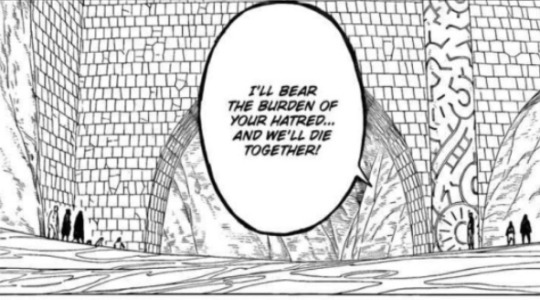
official viz:
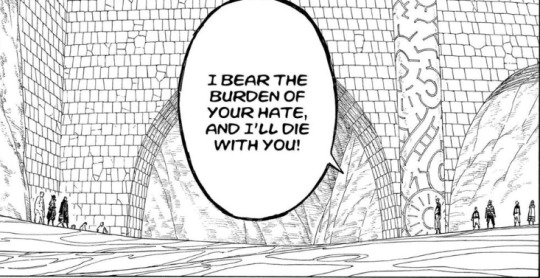
got a friend to confirm whether it’s ‘die with you’ or ‘die together’ and:
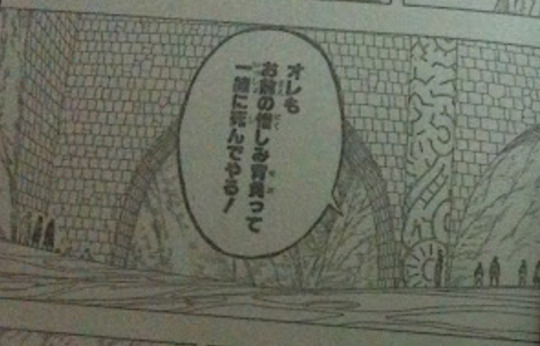
だからお前の憎しみを一緒に背負って一緒に死んでやる
die together
mangastream’s translation is slightly more accurate, and imo it makes all the difference. ‘with you’ does not carry the same weight as ‘together’.
#naruto#uzumaki naruto#sasuke#uchiha sasuke#i would give ANYTHING to read this in its original japanese form#because translations do lose the nuances#i can finally sleep in peace now that i know it's 'together'#aka my favorite version
44 notes
·
View notes
Text
Rambling
Since turbans act as an orientalist motif in Homestuck, I thought I might try scanning for hijabs as well. "The Veil" was the first suspect, but textual support did not immediately materialize. At least not in the form of wordplay -- it's mildly suspect that the game's cloning equipment is within the Veil, since the first lab we see is associated with Mom, but since the meteors in turn become the sperm impregnating Skaia/the Earth, I'm hesitant to commit to the gendering. Maybe one of those "size of your mom's dick" kind of moments? Shrug
"Curtain" was the next search term -- apparently the word hijab originally described a curtain separating Muhammad's main house from the wives' quarters, for modesty. Presuming euphemism, it becomes interesting that Karkat (who I tend to read as Alternia's only Female) is determinedly buried behind thick curtains at the beginning of Meat, as though they were part of his feminine repertoire of hysteric fits and romcoms -- all the more so because Dave reasons it would probably be fine to throw stones in a glass house if curtains were up, insofar as stoning-as-execution is still proscribed under some interpretations of Islamic law. Going back to the Veil, this would imply the meteor strikes are framed as a planetary stoning? Which in turn brings about the mummy-shrouded Exiles, wandering the sand dunes. Unexpectedly tidy, if we permit that the narrative's need to denigrate the Terrorist overrides any strict gendering
Other instances of curtain don't scan as readily... the various "pay no attention to the X behind the curtain" Wizard of Oz jokes seem ripe for misuse, but nothing stands out... Jane's comment on the "right" side of curtain being the side where everyone can see you... it rings as passive aggressive in light of the Islamophobic superstructure, but unlike with Dave I can't identify a complementary signifier to affirm the superstructure's applicability. Mildly annoying. But if you /assume/ its applicability, gently coaxing Calliope out from behind the curtain and encouraging her to be herself likewise comes across as somewhat passive-aggressive, I suppose
All that stuff about Roxy's Void-based unknowability from the Epilogues had struck me a sexist mystification, but the association with veils of darkness gives the misogyny a certain orientalist flavor... and if that holds, Roxy's earlier blackout powers fall under the same banner...? I don't recall anything objectionable in the discussion of them though... If Doc Scratch's head is a turban, I suppose the grimdark blackout becomes Rose's veil, adding to the sense of assault that came with Scratch "smothering her with surprise noodles" (eroticizing the question mark).
The cue-ball/turban is also light, of course, and the matter of Karkat blocking out the light contributes to his feminine framing... though I suppose the same could be said of the Strider's sunglasses? "Those rare, intimate moments that Jake was allowed to slip off Dirk’s shades and look upon his face, unobstructed" might be leaning into the erotics of removing a lady's veil... as well as the general mystique built up around Strider Eye Moments. The artifact of Stoic Masculinity doubles as an artifact of Islamic Femininity. Textual affirmation in the form of puns isn't really forth coming, but the matter AR wanting to get out of the shades might have an undertone of cultural condescension akin to Callie and the curtain... especially since as "anime shades" that "literally only the Japanese could consider to embody the Platonic ideal of 'cool,'" the sunglasses are explicitly linked to the Orient
11 notes
·
View notes
Text
Trees recommendations
Hello, long time no post. I want to start something here on my blog about any media recommendations. Whether it be games, books, movies, web novels, shows, etc etc.
I’ll start off with my first recommendation:
Title: Eternal Yesterday
Genre: Japanese BL
Category: Show
Episodes: 8
My thoughts: I usually don’t watch anything BL related because I don’t want to get caught up in the drama and negative connotation (which is honestly quite a fair assertion since many women (I am a woman) have exhibited tendencies towards fetishizing gay men when it comes to consumption of media regarding bl and mlm relationships). I do not actively engage or support the narrative of fetishizing gay men or mlm relationships. This is just a disclaimer. I myself am biromantic and when I usually search for shows or media to consume I try to actively avoid anything overly explicit since I am not trying to consume the media for the purpose or sake of finding my own fantasies or daydream pleasure about any acts of intimacy that might occur in said piece of media. Though I am biromantic myself I do get curious about some of the explicit intimate aspects or details that may occur in the media itself. Though I have to say I do find it quite distasteful if the only plot point is the explicit intimate actions of fan service that maybe liberally splattered throughout a series or work of media. For this main reason I don’t watch many American Tv shows despite being an American myself. I have gained a taste for some shows and media originating in China, Korea, and Japan, as well as Taiwan, and a bit of Thailand. I like how most of the shows I’ve seen from these areas contribute multiple story plot points while still being able to show the progression of the main love interests relationship through the entire show. While each countries media definitely has different styles of storytelling the Japanese BL eternal yesterday really caught my eye.
I don’t watch many Japanese shows or even Japanese BL for that matter so this was my first one ever to watch and honestly I was very surprised and impressed with it. What stuck out to me was the premise of the show, which showed a budding gay romance between two highschoolers. As someone who is interested in the concept of grief and death and emotional connections to others and those we love I thought it was beautiful at harnessing and processing those emotions and bringing it forth visually through the writing and acting and directing. It was perfect. Though I thought an 8 episode drama with a little over 20 minutes per episode would not be enough to really give the story it’s all. I was pleasantly surprised how it worked perfectly. It was a show that made me cry and make me think of my own relationship with my own bf. While it may have been a BL it harnessed different relationship dynamics that I thought was a lovely thing to do since it is about love in all its forms. I could go on forever about this show and honestly it will stick with me as a forever favorite.
Pls check it out.
I watched it on Viki. (I think you can also watch it on Netflix but pls double check the avaliable platforms of where this show might be to watch)
Rating - 10/10
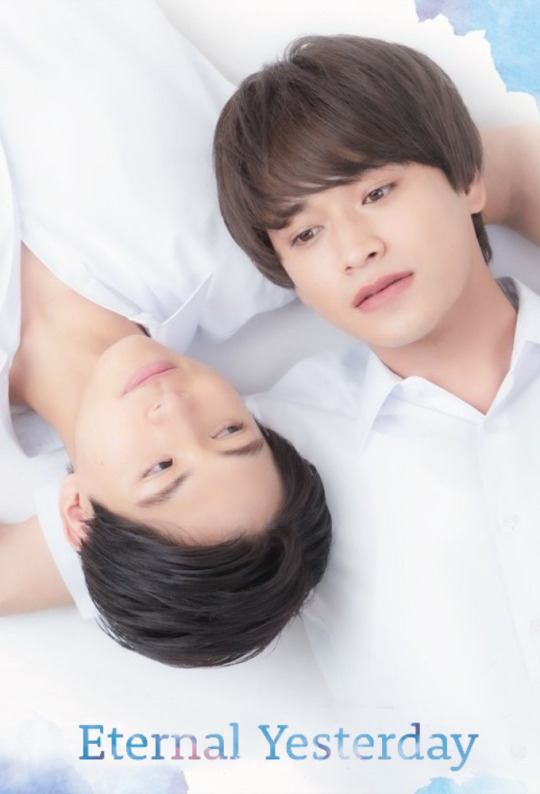
P.S - the pacing can be kinda slow but I loved the awkward pauses and camera panning because it in my opinion realistically showed the progression of a relationship between two people where one doesn’t want to intrude on the other and the other person is very reserved and quiet who also takes a bit more time to open up.
Thank you for reading this long long review. I hope yall learned a new show to maybe watch and enjoy or learn a little bit about me through my thoughts and opinions on this piece of media.
#tumblr fyp#explorepage#fypシ#fyp#explore#fypage#eternal yesterday#tv shows#i recommend#trees recommended#tv recommendations#Japanese shows#tree recommends#trees recommendations#media analysis#my reviews#my tv show review#thoughts and feelings#late night binge
2 notes
·
View notes
Text
anonymous asked
whats the ratio of inkling to octo in tsunaomi and why did you as the artist decide that
Tsunaomi is meant to be half Octoling, half Inkling, but in actuality, her design leans harder into Octoling traits than she does Inkling. That's mostly personal preference, though some were recent changes for ease of drawing. Because I literally have this unshaded piece open rn, you get diagrams.
Hair
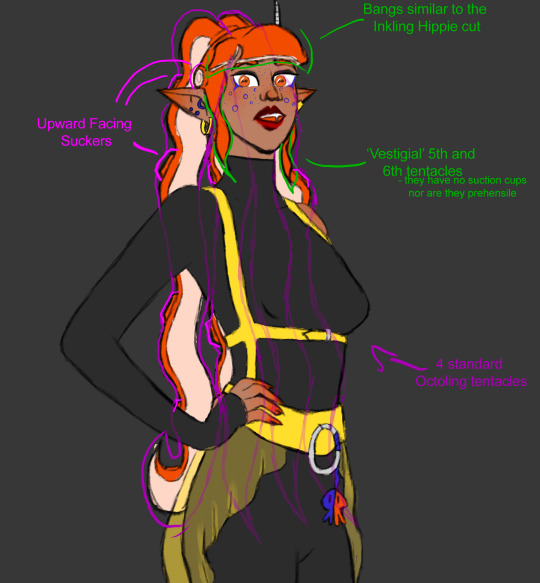
Octoling:
Naomi has 8 limbs in swim form, and this is reflected in her standing form as her hair.
She has 4 true tentacles that all use the Octoling shape.
All of her tentacles have upward facing suckers
Inkling:
Her bangs are basically the Inkling Hippie cut bangs
Naomi has these two little 'vestigial' tentacles - essentially just little framing fringe that lacks the muscles and do not correlate to anything in her swim form.
NOTE: Originally, I used to draw her with a mixture of 2 Inkling 'egg' shaped tentacles and 2 Octoling tentacles. I changed this fairly recently because I was never quite satisfied with how the 'egg' shaped ones looked, and would usually just hide them behind her body. This opens me up to more poses to draw for her, since I'm not dreading her hair.
Mostly, her hair shape is meant to mimic very iconic bangs throughout music history, like Stevie Nicks and Selena ( I'm specifically thinking of the Si Una Vez live video. ) Long hair with waves, thick, straight across bangs. She also accidentally read as cheerleader for so long that I just made it canon, lol.
Face / Body

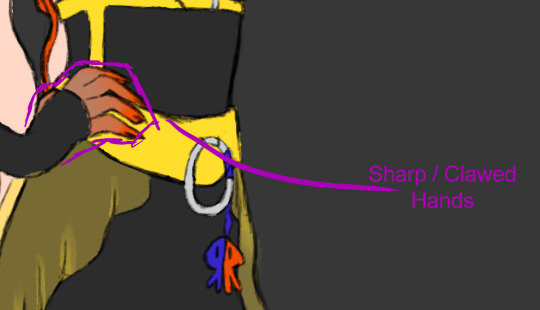
Octoling
Not even marked on here, b/c I think it's fairly obviously, her freckles are blue rings, like the Blue Ring Octopus. ( yes, this does mean she's full of neurotoxins. )
She has the 'sharp' * or clawed hands that Octolings have, as well as the ink transition color on her fingertips. **
The lil lopsided fangs are so cute, literally how could I not give that to her.
Oh, I also forgot to mark her pupils! I just think the 8 shape is neat.
* Canonically, the Octoling fingers are just a sharper shape than Inkling fingers, but like — Claws. Heart.
** Originally, I thought this was an Octoling-only trait, though ever since Deep Cut's designs dropped, I've decided it's actually a fashion / body mod trend, like a tattoo of some kind. Very popular in Takotsubo / The Octarian Domes, and it followed any Octarians who fled Inkadia for the Splatlands. Not very popular in Haikara / Inkopolis, though!
Inkling
Pointy ears - ironically, because we didn't know what Octoling ears looked like until Octo Expansion. I had assumed they were the same shape for years, lol.
Though, honestly, I would've picked the pointy ears over the rounded ones for Naomi anyways, I think they sell her design so well, and translate to my favorite part of her swim form.
Addendum: Swim form

I drew this in literally ten minutes haha.
Her swim form is basically an Octoling swim form, however, she has transparent fins on her head that make the triangle shape of the Inkling Squid form. I literally think its so cute you can't change my mind. Not related to her species make up, but I like to imagine she's like, Serval Cat sized - large, but not so large that you can't just scoop her up like a baby.
Other random facts that aren't really asked by the prompt:
If we're assigning real world ethnicities, Tsunaomi is Mexican and Japanese.
Her orange and blue color palette is literally just the default colors of Splatoon 1, but also, it's a darker version of the real world Blue Ring Octopus
I rarely draw her without red lipstick - another reference to musicians I really like; Again, Selena, but plenty of others too.
Her body type - thinner up top with thick thighs - is modeled after real world gymnasts and aerial performers.
2 notes
·
View notes
Note
I must ask about Yabusame. Anything interesting about them? What are some neat secrets they might be hiding ~ ?
Ooh, Yabusame is quite the tough one, we really just know so little about them! Anyways, I'll try my best though!

It's the Flawless Thoughtlessness — Yabusame Houlen
Name: Yabusame Houlen
Since we're talking about their name, I'll be using the Japanese order here, Houlen Yabusame (鳳聯藪雨).
The first thing you might notice is the use of an L in the romanization of their name Houlen. Japanese doesn't actually distinguish between /l/ and /r/, so either is technically fine as long as we're consistent, but JynX does actually consistently use R. So why the L here?
It's so that when combined with Tsubakura Enraku, their names can combine to give Len'En!
In Houlen, "hou" (鳳) refers to the Fenghuang (鳳凰), a bird in Chinese mythology said to be the king of all birds. It is often paired with the Yellow Dragon to represent the Emperess and Emperor and China respectively.
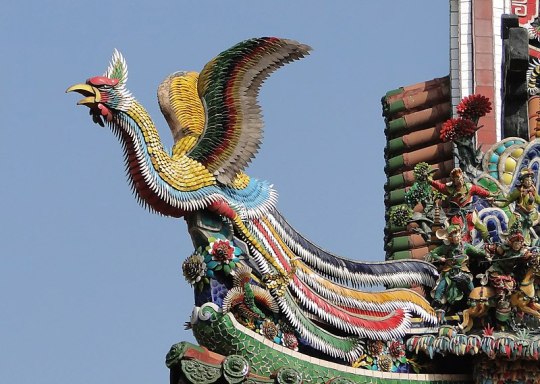
Although rarely used on its own, "ren" (聯) carries the meaning of "link" or "pair". Perhaps used in reference to the title of the entire series "connecting chain".
In addition, "houren" is also the reading of 鳳輦, which refers to a type of palanquin decorated with a Fenghuang on the roof, used specifically by the Emperor. Nowadays it also refers to the same type of palanquin used in Shinto shrine processions as well.
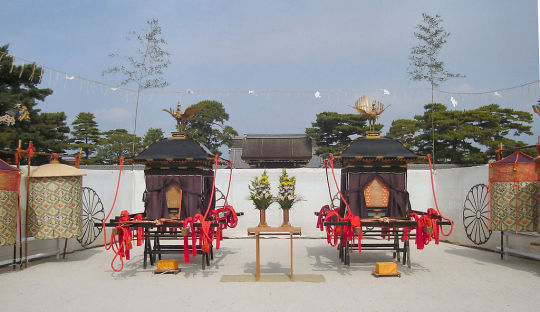
In "Yabusame" (藪雨), "yabu" (藪) means "grove while "same" (雨) means "rain". Read together it refers to the Asian stubtail, given this name as their cries are said to sound like rain pattering on a grove.

Curiously enough, while Yabusame's name is indeed a Bird's Name, they are the only character so far with multiple birds in their name that are not related in any way, literally or through wordplay.
Titles
Yabusame is one of the few characters to have two titles. First, their default title: Flawless Thoughtlessness (天衣無縫の能天気)
天衣無縫 is a phrase that literally means "a celestial's clothing has no seams", which refers to something that is naturally flawless with no trace of artifice. So this is where "flawless" comes from.
能天気 refers to an easygoing person who never thinks deeply about anything, which is where we get "thoughtlessness from".
In their chef form in BotC, they're titled Chef Unbound in Any Direction (縦横無尽な調理人).

縦横無尽 literally means "vertically and horizontally endless", and refers to someone who acts freely and as they wish, hence "unbound". 調理人 simply means "chef".
Basis: Dimensions and String Theory
Similar to fellow protagonist Tsubakura Enraku, it's difficult to identify any particular figure, historical, mythological or otherwise, in them. However, it is fairly clear that Yabusame is based on dimensions and string theory.
Dimensions
Yabusame's most obvious tie to the concept of dimensions is their ability, "something like crossing dimensions". While Yabusame is indeed shown to be able to do so, like in BPoHC's tutorial where they crossed into an alternate Mugenri, how this is achieved is unclear.
Curiously, JynX personally considers Yabusame's ability the most dangerous in the series so far, although the reason remains unexplained.
The most common application of Yabusame's ability is their "hyper-dimensional pockets", portals that connect two different dimensions. They use them to send and retrieve things to and fro between dimensions, an example being their spell Confused Origins "Screen Shuffle", as seen below:
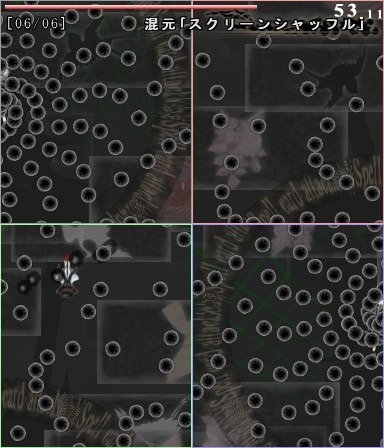
There are a number of possible curiosities possibly related to Yabusame's abilities, such as:
Yabusame is apparently only "technically human", whatever that means
Suzumi's abilities seem to have next to no effect on Yabusame at all, and even if they rewound time after killing them it would apparently still leave them dead, according to Suzumi
While Yabusame seems to have free control over their ability, EE's bad ending would imply that they need to fall asleep to truly transport themself between dimensions
JynX said that there are "no longer" alternate Yabusames across different dimensions, the Yabusame we see always being the singular Yabusame (Which raises very curious questions about BPohC, actually)
A popular theory as to why this is, is that Yabusame exists simultaneously as one being throughout all the dimensions.
It would seemingly explain why they are so very scatterbrained, as their attention is literally scattered across various dimensions; as well as why killing them would be a permanent action even if time was rewound, as time is a dimension itself.
If this were the case, then perhaps sleeping to travel between dimensions is merely for Yabusame to shift their main focus between them; and the fact that there are "no longer" distinct, separate Yabusames in each dimension would imply a fusion/takeover of some sort.
However, we should of course keep in mind that this is all a theory, and is nowhere near confirmed.
String Theory
Disclaimer: Physics is not my strong suit, and I know next to nothing about string theory, so while this is probably the juicy part I won't be able to say much here. All I can do is point out some neat little references.
Yabusame's birthday, 26 November (26/11) may be a reference to the dimensions required in different variations of string theory: The M-theory calls for 11; while the Bosonic string theory calls for 26.
The M-theory is also referenced in Yabusame's personal themes Wings that Transcend Spacetime ~ M theory and Feathers Flying off the Beaten Path ~ Eleven-dimensional.
EmEv Holdover: Serintsu
So I sort of, kinda lied when I said that we can't identify any basis for Yabusame. We do have one from Emergency Everyday, the dropped predecessor of Len'en from which our modern Len'en is based on. We should keep in mind, however, that JynX did not work on EmEv.
It is likely that Yabusame is somewhat of a renewed Serintsu.

A human with the ability of "something like crossing dimensions", from what we can see of EmEv's trial version, their story from their game is largely identical to that of Yabusame's in EE.
However, other than this, the two share no other similarities and it is fairly safe to say that EmEv's main influence on Len'en comes from its premise and story more than anything.
So! I think that concludes our little look at Yabusame. Truly a mysterious but extremely fun character, let's hope we get to learn more in the future~! Until then, I leave you with this early concept art of Yabusame, which I think deserves to be appreciated more! :)
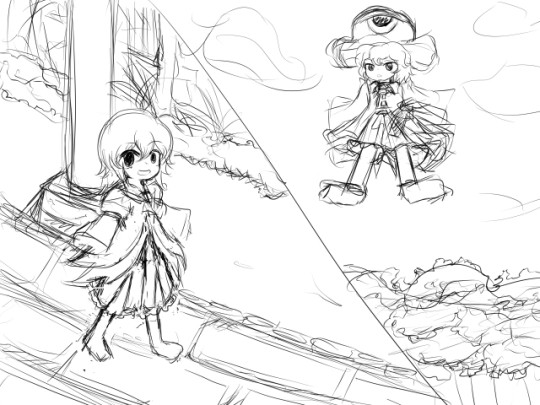
#len'en project#len'en#yabusame houlen#serintsu#maybe I'll try to learn more about string theory one day#big maybe#just for you yabusame
18 notes
·
View notes
Text
June 10: Kinkakuji and Rock Gardens
Today, we got to use the bus for the first time on our way to Kinkakuji. Let’s just say it is not nearly as convenient as the subway was in Tokyo. By the time a bus with enough space for most of our group came by it had already been around a half hour or so at least. Once we finally were able to get on a bus we rode for about 40 minutes to the aforementioned Kinkakuji (kanji: 金閣寺; in English it is usually referred to as the Golden Pavilion).
Once we got there, I was genuinely impressed by the beauty of the temple. The majority of the outside of the temple is covered in shiny gold, and the structure itself is a great example of Chinese and Japanese architecture at their finest boasting a sort of simple elegance.


After lingering for a bit to grab lunch, we then headed over to Daitokuji (kanji: 大徳寺; in English the three kanji literally translate to “great virtue temple” although there is probably a more elegant translation out there). Here, we were able to see some rock gardens which I think ended up being a group favorite for our trip.

At the first garden we went to, we had a guided tour which exposed us all to some Zen Buddhist philosophy. The guide also explained the story that the garden was representing as we walked around. However, in addition to the tour being fascinating, we also learned that the part of the temple that we were in had been around for 500 years without burning down or being destroyed, making it a very important historical artifact.

At the second garden, we did not have any sort of tour, but many of us just sat there thinking while staring at the arrangement.

After discovering within ourselves the falseness of the duality of all things, we split up for the day.
Academic Reflection:
In 1950, Kinkakuji was burned down by an arsonist monk. One of our readings today was a historical fiction of this story by Mishima Yukio. In this story, the man who burned the temple down was originally sent to live nearby as a monk by his dying father. Whenever he was far from the temple, the thought of its beauty would overwhelm him, and he found himself unable to enjoy anything else because nothing compared to the splendor of the temple. This somehow led to him having twisted feelings toward the temple which he eventually proceeded to burn down when he finally snapped.
While I don’t understand why he had to burn the building down, I can see why one would have such strong feelings towards it. To me it was the kind of place where one could sit for hours and admire the scenery. The shining building juxtaposed with the calming atmosphere of the surrounding garden certainly was something to behold. The way Mishima portrays the feelings of the monk makes visiting the temple all the more interesting because it gives the perspective of someone who saw the old Kinkakuji. How amazing it must have been to see a relic that had been lost be rebuilt and made even more beautiful as it was restored to its original form which hadn’t been seen in centuries.
2 notes
·
View notes
Text
So, you remember the plans for that Ed Edd n' Eddy (Assassin AU) fan comic series? Well, I think I've finally gotten it figured out, and I'd like to make this post to help ensure I don't forget (and maybe get people interested). Click "keep reading," if curious.
I've decided to forego the concept of "werebeasts," but only for the comic of C2ndy2C1d's AU idea. For a different and fully original series involving assassins, I'll utilize it 'cause it'll feel less jarring and all then. I mean, I'll give myself points for trying to give a reason why animal-hybrids existed in the AU's world, instead of basically telling the audience just to accept the fact; but let's face it, good excuse/reason or not, it always felt off and more a likely turn-off to viewers than anything.
If you really wanna know the whole "werebeast" ordeal: the organization's lab managed to reach a breakthrough, in form of living tools that combined animalistic and humanistic abilities, and they planned to offer these new creations to the more interested assassins for better/easier job completion. If you want an example, the best I can describe is to think of it like a "Kiba and Akamaru" situation, from the Naruto series, except with some animal/human-hybrid than a ninja hound. Again, it can be an interesting concept and idea, assassins working with animal-hybrid partners that serve them as needed, just perhaps not fitting for the "Assassin AU" of EEnE.
I'm still using Claire and Yami, though, they're just normal full-humans now that utilize a respective wolf/fox theme to them. However, there are a few extra changes: Cio will be added to the cast and HE'S the one with the Eds, Claire is now with Sarah and Jimmy (pray for the kid), and it's a concept of apprenticeship than being assigned to some "master." Yami and Nazz will still be paired up, as a dynamic Japanese-styled duo of swordsmanship and Ninjutsu (NOT like Naruto but the actual art).
Why apprenticing? Well, the organization decided its... "recruits" would have a higher success rate in "graduation" and the like, if they were given prior field experience, before the time comes to prove themselves. Yeah, let's just say, the resulting numbers weren't meeting the demand, with how they currently ran things... So, for some extra financial compensation (cue Eddy immediately dragging his friends into this), the veterans have a chance to train a greenhorn; but that means they share the consequences, if a pupil fails to properly graduate. If the pupil graduates, it's really up to them and their mentor whether they'll continue partnered up and all.
Mentors get to choose one candidate from a list of "most compatible" ones, and then that trainee will be under their wing for a bit. Nazz picks Yami because of her Japanese-based interests (more technique than racially-related), The Eds pick Cio because his brains are sure to pair well with Double D's (thus Eddy can make HIM do all the mentoring and rake in easy bucks), and Sarah and Jimmy pick Claire because I hate the kid and enjoy seeing them bully her.
... Okay, that's just the OUT-of-story reason I have, aside from her fighting style working well with theirs. The two will claim it's because they wanted a little extra spending money-- specifically, they want this giant plushie that'd be a great addition to their base. They also, especially Sarah, enjoy the idea of having someone to boss around and all, and you could "practically see [Claire] trembling in her photo~"... However, Claire's predictable meekness/timid-ness, making for a fun and obedient "toy," doesn't convey their full reason for choosing her specifically, nor are "serving toys" the main reason why they even entered the apprenticeship program... Sorry, but THAT isn't getting spoiled here.
As for Kevin, Rolf, Jonny and the Kanker Sisters, they won't be getting apprentices for their own reasons: Jonny and Plank already have to worry about getting just THEMSELVES safely out of their explosions, Kevin is more of a lone wolf and only partners with someone when necessary, Rolf would have rather passed on his knowledge of farming than assassination, and the Kankers probably would "be busy enough, without having to watch some helpless twerp" (perhaps as Lee would put it).
So yeah, I finally feel good about the fan comic now, and I can't believe I hadn't thought of it sooner! Heh, sometimes it's the simplest of solutions, like learning to get over Claire not actually being half-wolf... Aw well, I'm excited to start work on it, in between my fully original works, so I hope you all are, too!
0 notes
Text



And that, kids, is why you don’t machine translate, or at least don’t rely on it—especially with dialect. It barely knows how to handle standard Japanese, so throwing a dialect, especially other than the popular Kansaiben, into the mix isn’t going to help matters. MTL can be a useful tool to help you get your bearings, but you should always take what it gives you with a grain of salt and use other resources as well.
If this were an imperative the way Google Translate translates it as, it would just be 立て, or 立てよ. Of course, there’s also 立てろ(よ), but that’s the imperative of the transitive verb 立てる, “to stand something up,” and this here is intransitive. Yes, this sentence ends with an エ sound, as many imperatives do, but only く verbs have け as their imperative, and this isn’t one.
So let’s look at what Yuni’s actually saying here.
First, we have the verb. This is the intransitive verb 立つ “to stand (up)” conjugated into the potential: 立てる “to be able to stand.” Next we have け, which is a question particle in Fukuiben and will replace か in many instances.
He’s asking, “Can you stand?”
GT completely changes the tone of this line. Cold and calloused, he orders Chika, who’s slipped and fallen after having already lost the use of his glasses, to stand up. But that doesn’t sound like him, does it? In the original, he’s worried and concerned about his best friend who’s already at a disadvantage and may now have hurt himself too and asks if he’s able to stand... while extending his hand to help him up.
Though it turns out, even if you put it into plain Japanese, GT still doesn’t know what to do with it, for the most part, and neither does DeepL:

The third is because it doesn’t realize it’s the potential form of 立つ, not the plain form of 立てる, and the first may be as well. At least, that’s the closest I can figure. The second... I have no idea. With just の, it gives you “to stand.” But with just んか or のか, it does finally get it. And literally the only difference between these is politeness/formality level.
DeepL, while often more reliable than GT, actually gets it worse, though:
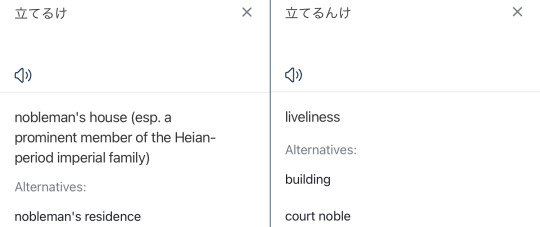
I have no idea how it got “nobleman,” but “house; residence” is from the け reading of 家. Changing the け to か does not make it realize it’s a question, though it does change the translation to “making something stand up.” Which I was somewhat surprised about, considering 家 can also be read か, although that reading has to do with people/professions/etc. rather than houses.
立つ and 立てる can refer to constructing buildings (though I don’t know, if at all, how it differs from 建つ and 建てる), which is where “building” comes from in the second, though you wouldn’t stick の/ん between a verb and a noun since those just attach directly, so I still don’t know how it gets that.
But “liveliness”? “Court noble”? DeepL apparently has a habit of just guessing since it prefers natural-sounding English over an accurate translation, so that could be what that is, though I didn’t see anything about either in Goo辞書’s entry for 立てる.
This habit of guessing could be why it gives you “How are you going to stand up?” (all its alternatives also using “how”) for 立てるんですか, despite there being no “how” in the Japanese. And then for 立てますか it gives “Would you like to stand up?”
For 立てるの, it gives you “Stand.” or “Stand up.” With the period! Even GT didn’t do that when it thought it was an imperative. And this... definitely isn’t. A sentence-final の could be explanatory/emphasis (のです/のだ) or interrogatory (のか) with the second part dropped, but it’s not gonna be used with imperatives. Not to mention that there is no imperative that ends with る. There are verbs whose second-to-last mora is る, but imperatives for ichidan verbs are formed by dropping the final る and replacing it with ろ, while for godan verbs they’re formed by changing the ウ sound of the last mora to an エ (れ for る verbs, て for つ verbs, etc.). Even if a verb exists that ends in -るる, the imperative would be either -るろ or -るれ.
Like GT, with 立てるのか, it does finally give you the correct translation.
#deepl being more wrong overall than gt was a surprise#i don't use it but i'd heard it was supposed to be better lmao#mtl mishaps#2.43 vol 1
1 note
·
View note
Note
Thoughts on milcery and its evo’s two million forms

Milcery is... fine; nothing special but certainly not bad. I think the best thing about it is actually its animation, which is probably one of my all-time favorites in the series; the single drop moves throughout each of the splash waves in a circular pattern, which looks super cool and appropriately fluid.
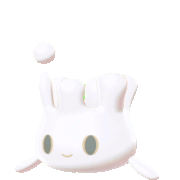
Other than that, compared to Alcremie, it doesn't really stand out that much; it's just a splash of cream with a face on it, though I do like the pupil-less eyes. I get what they were going for with it, as you have to mix (spin) whipping cream to form stiff peaks of whipped cream, but ultimately it feels like it exists solely for Alcremie's gimmick. I'll go into this more later, but I think my ideal situation would be to just drop Milcery and give Alcremie an evolution instead. As is, it's serviceable.
Side note: both the English and Japanese names of this line reference magic/alchemy for no real reason. I kind of wonder if the beta Milcery was supposed to be a cauldron or something, and Alcremie's pointy top was supposed to be a witch hat, kind like how Murkrow was more witchy originally. That's just speculation on my part though.

I do question if "vaguely human-shaped creature with dress" was the most interesting way to handle a pile of sentient cream, but regardless, Alcremie's pretty sweet (pun very much intended). Design-wise it's nice and simple; the sweet accents on the "hair" with a matching eye color and some swirls to show the shape of the cream. I think I would've liked it without any mouth (and maybe any arms), but it at least has a cute, somewhat oblivious expression instead of the standard smile that adds some personality.
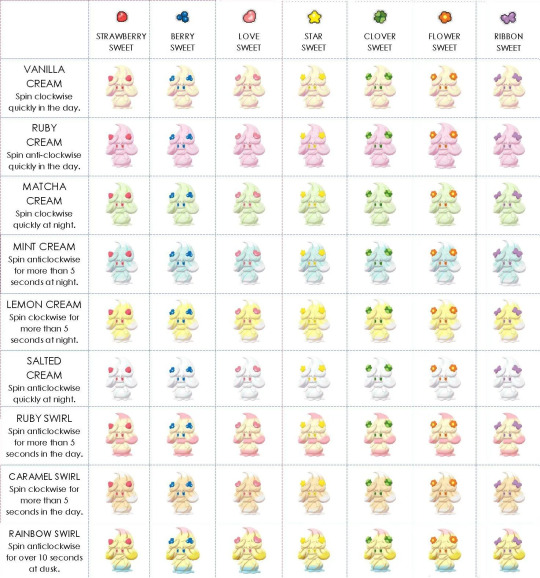
The other noteworthy thing about Alcremie is the fact that it has 63(!) forms, 7 sweets to mix in and 9 different flavors. The forms are fun and add a lot to the design, though I don't know if I have any strong preferences towards any of them. For me personally, I'd rather have less forms but more distinction between them, like Vivillion, than 60+ forms that all look pretty similar.
My favorites out of the forms would be the ruby swirl with strawberries (similar to the standard art, but I like having the darker points on the body, as it helps break it up a bit), and the caramel swirl with flowers (the most delicious looking and one of my fav colors).

Least fav is probably any of the star-sweet ones just because their eyes look mildly possessed with the lighter color. Overall, however, none of them are really bad (aside from maybe the shiny. black cream just looks moldy).
Also, side note: why is Alcremie all-female? It's a sentient pile of cream, shouldn't it be genderless? I feel like Gamefreak's had a bad habit of taking anything vaguely "feminine" (read: dress) looking and making it all female. I guess you could argue milk only comes from female animals, but Alcremie is made of milk/cream, it's not the thing producing it in the first place. It's not a big deal, just head-scratching.
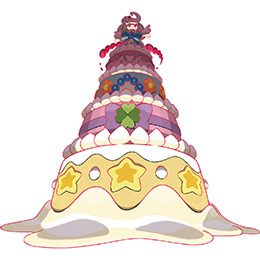
G-max Alcremie is interesting, because most g-maxes are just the same Pokemon but bigger, without really advancing their original theme. However, g-max Alcremie here actually does logically continue things, going from cream to an entire cake with cream frosting. This makes it a lot better than most g-maxes... almost too much better, in fact, because the line feels incomplete when the g-max gimmick is inevitably stripped away from it.
Going back to what I was saying earlier: what I would've liked to see is Milcery dropped entirely; you could instead have a "plain"-flavor Alcremie that you do a permanent form change with instead of deciding upon evolution. Then, have Alcremie evolve into a small cake that retains the flavor and sweets of the Alcremie, and have that evolution have this g-max, to tie everything together. That way, when the g-max is removed, the line still feels complete.
That aside, visually speaking, having the Alcremie serve as a cake-topped of sorts is cute, and I like how all the sweets are incorporated into it (I would've liked to see there be a g-max for each form obvs, but this is a good way to handle it if that wasn't on the table). It's hard to see here, but I also like the tweaks to Alcremie's design, such as the bow, the shape of the arms, and the swirly hair.
So overall: Milcery has a very fun animation but an otherwise plain design that doesn't really stand out. Alcremie is pretty solid, and the different forms are fun even if they're a bit too similar. The g-max is one of the best out there, and I would've liked to see an evolution to go with it so the concept isn't lost when the gimmick is. Overall, a fun (and tasty) little line.
81 notes
·
View notes
Text
An Essay on Love in Evangelion: 3.0+1.0 Thrice Upon a Time
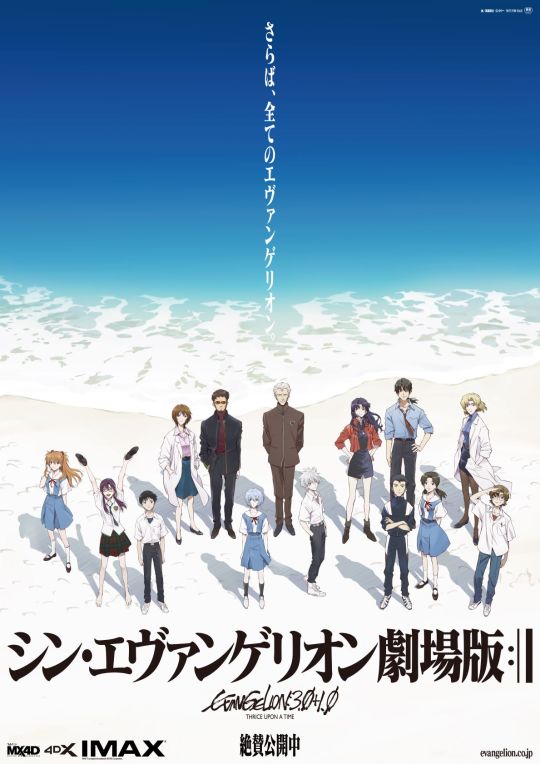
Evangelion: 3.0+1.0 Thrice Upon a Time is a movie about love in all its forms. From the love of family, friends, and neighbors, to the compassion we feel for people we have never met. The movie reminds us that love is something we continuously gain, lose, and choose, again and again. Which love is greatest? In my opinion, the answer to that question is left up to interpretation. In this essay, I will give my own personal interpretation on certain character interactions and what I believe we are meant to take away from their Rebuild portrayals.
The character I will start with is one I’ve noticed the most outrage over from people who haven’t seen the movie and read out-of-context spoilers: Kaworu Nagisa.
Kaworu is a beloved character among many Evangelion fans, especially those who are members of the LGBT+ community. He is a canonical love interest of Shinji Ikari and I want to reassure people that this final movie does not change that fact. However, it does not make the couple blatantly endgame either. This skirting around the couple might make some fans upset, and while their feelings are completely valid, I do not think they fully understand the difficulties faced by LGBT+ people in Japan, nor do they understand the way that romance is typically conveyed in Japanese storytelling. (I recommend watching “Is ‘Yuri On Ice’ Good Gay Representation?” by James Somerton for more about storytelling nuances.)
What have we been shown about Shinji and Kaworu’s love? The good news is, anything you read into the original TV series and End of Evangelion is completely true for the Rebuilds— because Kaworu is the same Kaworu. This movie proves Evangelion is a single universe set on repeat, and that Kaworu and Shinji meet each other every loop, and in each, Kaworu is trying to make Shinji happy. Within the final movie, Shinji becomes aware of the loops and chooses to break the cycle and free Kaworu from his pain.
What does the relationship between Shinji and Kaworu teach us? I believe the purpose of their love is to show the audience that first, in the words of Kaji, “love has no gender.” Second, I believe Kaworu’s love in particular is a warning about basing your own happiness solely upon another person. There are parallels drawn between Gendo/Yui and Kaworu/Shinji. Gendo could not exist without Yui, and so he was willing to destroy the world to be reunited with her. For Kaworu, it was not the destruction of humanity, but the destruction of himself that defined his tragedy. What’s important within the final movie, in my opinion, is that Shinji does not reject Kaworu’s love. With the insight he’s gained from remembering past loops, he sees Kaworu’s love and appreciates him, but he also sees his suffering and wants to ease it. He helps Kaworu into a new world where he can seek his own happiness and find balance in his life (something his father did not have).
While Kaworu and Shinji are not seen as an explicit couple at the end of the movie, it’s significant to note that, when he sets Kaworu free, Shinji holds out his hand to Kaworu as a promise to stay together. Over the course of the movie, Shinji comes to accept his connection to others through accepting touch (in the form of hand holding and hugs from Rei, Misato, and Gendo); however, Kaworu is the only character in the movie who Shinji initiates physical contact with and that speaks to how much Kaworu means to him. This simple gesture, in my opinion, keeps the door open for Kaworu and Shinji to be a couple one day, after Kaworu has found more balance in his life.
If I were to write an entire essay about Kaworu, it would be titled, “Out of the Coffin: How the Resurrection of Kaworu Nagisa Buries the Tragic Lovers Trope” because this movie truly does just that.
Another potential love interest for Shinji for many years was Asuka; however, unlike with Kaworu, the nature of this relationship is not left up to interpretation by the end of the movie. Before her big final battle, Asuka tells Shinji, “I think I loved you back then” (regarding their time in middle school) and Shinji, during Instrumentality, tells Asuka, “Thank you for saying you loved me. I loved you too.” It is past tense.
What does this relationship teach us? It’s a beautiful way of showing that we can love people, and grow and learn, and let go when we no longer fit each other. Letting go is an integral part of life. Whereas other Instrumentality scenes involve touch, Asuka’s, mirroring the ending of End of Evangelion, has a distinct lack of touch. Shinji sits with his arms around his knees and Asuka turns her body away from him. He gives her his thanks and he sends her off to find her peace. Asuka and Shinji teach us that it’s okay to grow out of relationships. You can appreciate what they were to you at the time they happened and move on.
What about Rei? To be honest with you, this movie is less about Rei’s relationship with Shinji, and more about her relationship with the world. Rei teaches movie viewers about the simple pleasures of living. While Shinji is in mourning for the first quarter of the movie, Rei (as “Sokkuri”) is learning about crop growing and community, the wonder of babies and kittens, the joy of the bath after a long day of fruitful work, and the power of words and picture books. At the end of her life, she only regrets not having more time to spend with the people she loves. In Instrumentality, Shinji accepts her hand when it is offered to him, which I hope signifies he is ready to see life as she had come to during the final movie.
Rei teaches us that we can love living and to not take our limited time for granted.
Next, we move on to parent figures: Gendo and Misato. I think they both represent people ill suited to the role, who do the best they can despite it. Gendo, as mentioned for Kaworu above, is a warning about defining yourself by your relationship to another person (Ikari, afterall, is Yui’s name). He is also a lesson in how people mourn and how they can lash out. Misato, like Gendo, felt herself a poor parent, and while mourning the loss of Kaji, she gave up her child to be raised by other people, but, unlike Gendo, went forward to put all her energy into protecting humanity. Both of them reach out to hug Shinji within the movie and he accepts them where they are.
While I wouldn’t say the movie shows that Shinji forgives Gendo, it does show his making an effort to understand and make peace with what others have done. For Misato, it is fair to say we can still hope for a better future, even when it feels like everything is crumbling around us. Her self-sacrificing love for her son and the whole of humanity is what enables Shinji to then save the people he loves (via the spear of Gaius).
In the movie, we are also shown friendship. Touji, Hikari, and Kensuke are important members of their community who maintain open communication with those around them and respect others’ boundaries. They are patient and kind and represent the importance of being present. They teach us to meet people where they are and support them how we can, whether it’s giving them a warm meal or giving them space when they need it.
There are many more characters that could be talked about, but today I am going to end on Mari. Mari’s love is physical. She enjoys being in people’s personal bubbles. She cuddles Asuka and helps trim her hair, she gets into Gendo’s space at college, and at the end of the movie, she reaches out her hand to Shinji to help him stand up from his seat. Upon first glance, some viewers might take Mari and Shinji’s final scene to be romantic, but the reality of it is this: We do not, and cannot, know what kind of love she is meant to represent in his life.
We do not know Mari’s relationship with Shinji because they hardly interact in the movie. She clearly cares about him, but in my opinion, it comes from a place of duty and compassion— Mari was friends with Gendo and Yui. She has been there since he was born. (If we take the manga to be canon, then Mari even had romantic feelings towards his mother. Her hairstyle and glasses are from Yui. At the end of the movie, Mari has changed her hairstyle, which to me implies she has moved on, and “getting” with Shinji would be a thematic break.)
Additionally, their conversation, while flirty, is very much one that implies they haven’t seen each other for a while. Mari is someone who is very physically affectionate. With everyone. If someone ignores that and focuses on the fact she gets into Shinji’s space and claims that’s romantic, they better acknowledge it’s possibly romantic with Asuka, who we see far more intimacy with. When Mari flirts, Shinji flirts back and her initial reaction is surprise, “Wow, you’ve learned to talk back!” Her purpose is clear. She is there to remove the DSS choker from his neck.
Personally, I love that Mari is the one to close the movie, for the exact reason that we do not know her relationship with Shinji. For Mari to have an assigned role would be to say, “This kind of love is most important,” when the entire movie was spent showing us each love is of equal importance in the balance and building of our lives. (It’s wonderful to see those types of love embodied across the platform from Shinji at the end of the movie: Rei and Kaworu, who, just like in End of Evangelion, could signify the ability to connect with others and be loved.)
If you view Mari as a romantic love interest, then I think it speaks to the value that you as an individual give to romance rather than what the characters themselves are feeling. To me, Mari, the character who was created to “destroy Eva,” is a symbol of all love. When Shinji takes her offered hand and then pulls her to run into the new world, it’s a symbol of balance. The give and take of any kind of relationship.
We are the product of every relationship we have ever had, from our parents to the people we once loved, from our friendships to any other person we want to stay connected to. Evangelion: 3.0+1.0 Thrice Upon a Time is a story about these relationships. It is a story about love.
#rebuild of evangelion#kaworu nagisa#shinji ikari#asuka shikinami#mari makinami#rei ayanami#misato katsuragi#gendo ikari#thrice upon a time#kawoshin#essay#movie review#shinkawo
472 notes
·
View notes
Photo


Deep Analysis of Adult Souichi and Fuchi’s Relationship
(English Translation Vs Japanese Orignial)
It’s super long so imma put it under the cut and write a small description of what is written here for those who don’t have the time to read this all...
.......
・Souichi and Fuchi were never married (binzo was born out of wedlock)
・Souichi had a fling with Fuchi (nothing deep or meaningful tho!!!)
・Fuchi DID NOT RAPE SOUICHI!!!!!!!!!!
・Souichi purposely fucked and impregnated Fuchi (Breeding kink???eheh jkjk)
・There are 0 mentions of Souichi “loving” Fuchi whatsoever
・Souichi does not deny anything his brother said about him and Fuchi
:)))))))))))))))))

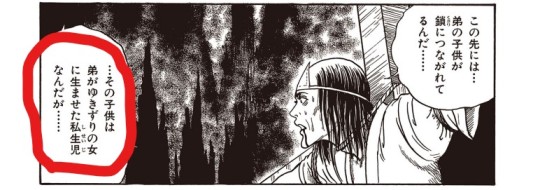
First, let’s talk about the line “The kid is the love child from one of his affairs.”
The translation for 私生児 is “love child” here, and that’s not an incorrect translation, but there is something else that I want to clarify about this word in Japanese. 私生児 refers to a child born outside of marriage.
In other words, Fuchi and Souichi never got married!!!!!! She is not his (ex)wife!!!
Along with this, there is a really creative translation that was used for ゆきずりの女. The translation for this is “one of his affairs”, However this is crazy off. By using the word “one of”, that means he’s had many relationships. But that’s not what that word in Japanese means at all! Instead it is referring to Souichi and Fuchi once having a fling. It does not state that he “loves” her. He just fucked around with her cuz .... he wanted to???
I think perhaps, she was smitten by him because he called her a “beautiful lady” and from there a small relationship (?) started to form between the two of them. But, ultimately, he just wanted a son, and after receiving it from her he just left with the child. LOL idk just a guess really. Cuz why the fuck would he fuck her (without actually loving her) and then TAKE THE CHILD. ITS LITERALLY BACKWARDS SOUICHI!!!! YOU FUCK THE GIRL, SEE THE KID, AND RUN!! NOT, RUN WITH THE KID!!!!!
Maybe he gets some of his power from Binzo??? HMMM???? idkidk
Lastly for this section, and this one is important, the word 生ませた was never translated. This word being translated debunks the big theory everyone has in regards to Fuchi....
Basically what this word means in this context is, Souichi purposely got Fuchi pregnant!!!! He fucked her and came in her on purpose to make her have his child!!!!!!!!!!!!!!!!!!!!!1
In other wordsssss.... Souichi has a breeding kink. 1000000000% eheheheheh
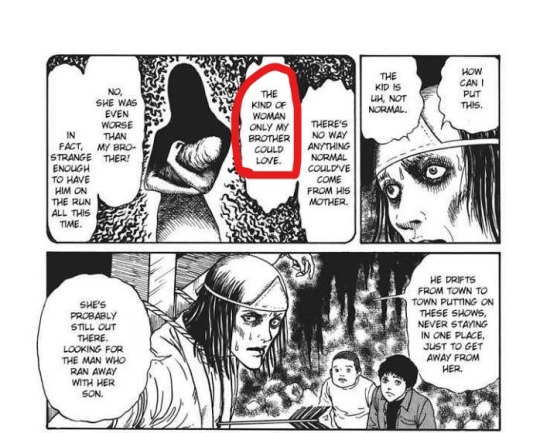
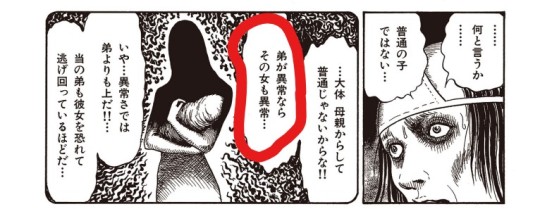
Next, the line “The kind of woman only my brother could love.”
Ok so this line is 6000000% off.
What is says roughly in Japanese is, “My little brother isn't normal, so that means that that woman isn’t normal either...”
Absolutely NOTHING in the JAPANESE original states that Souichi “loves” Fuchi!!!!!!!!!!!!!!!!!!!!!!!!!!!!!!!!!!!!!!
And it’s not like the translator rearranged the words to make it flow more smoothly. No. It’s just a completely incorrect translation.
I get that that line was hard asf to translate (i struggled to translate it now and still didn't do a good job) but ultimately it gives off the wrong impression to everyone... smh smh smh....


Nextttt. The translation for お...お前, when Fuchi suddenly shows up. I mentioned this in another post, but imma say it again cuz why not lol.
お前 is most commonly translated as “YOU”. Either as a casual greeting, or whenever someone is displeased (etc etc etc).
As a translator, I understand that the person who translated this might have been trying to add some creativity to Souichi’s line. Perhaps by making him say the word “sweety” it will seem like he’s trying to calm Fuchi down. Which was very creative and I like it!
But personally, it gives off an impression that is soooo offfff from the original that it makes me cringe.
He obviously doesn't love her, so translating that word as “sweety” is just overkill imo....


Lastly, and this isn't about a mistranslation or anything, I just wanna clarify that Souichi did not deny any of the things his brother said.
HEHEHEHEHEHHEHE
THE END.
218 notes
·
View notes
Text
Japanese vs. English Dabi A 293 Comparison
Chapter 293 gave us another great speech by Dabi, filled with all kinds of information. Similar to my post for the previous chapter, the official translation for chapter 293 has, unfortunately, once again made some changes in regards to Dabi’s speech due to its bias that I would like to share and explain here to give a better understanding of Dabi’s actual character rather than just leaving it at his American version.
Because Dabi said so much in this chapter and we will be comparing the panels from the Japanese version and the official English translation and taking apart the Japanese phrases, the rest of the post is under the cut (this post may or may not be just below 6k words)
The interaction begins with a short exchange between Dabi and Shouto as the former is hugging his younger brother mid-air while the others are still on the ground trying to take down Machia. In the official translation, Dabi begins by pointing this situation out to Shouto.
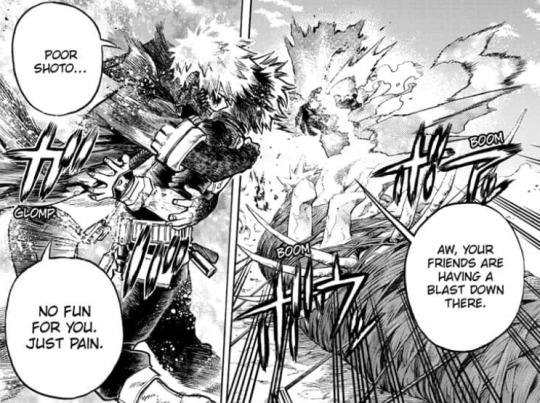
The two panels aren’t too different from the Japanese version, but this is another case of lost nuance. So here’s the original for comparison:
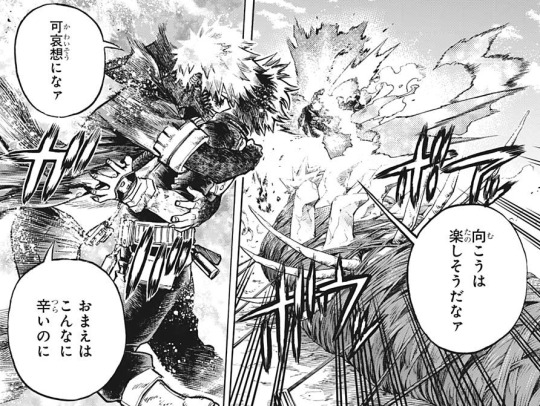
The speech bubbles read:
「向こうは楽しそうだなァ」
「可哀想になァ」
「おまえはこんなに辛いのに」
Breaking down the first line we get
「向こう ; mukou」-> other side; other party
「は ; wa 」-> topic marker particle
「楽しそう ; tanoshisou 」-> looks fun
「だ ; da 」-> casual form of です (desu); be; is
「なァ ; naa 」-> sentence ending particle; expresses emotion/sentiment
= “The others seem to have fun, huh?”
Then we have the second line:
「可哀想に ; kawaisou ni 」-> pitiable; poor (interjection)
「なァ ; naa 」-> sentence ending particle; expresses emotion/sentiment
= “Poor thing, huh?”
And the third line:
「おまえ ; omae 」-> you
「は ; wa」-> topic marker particle
「こんなに ; konnani 」-> so; like this
「辛い ; tsurai 」-> bitter; painful; heart-breaking
「のに ; noni」-> even though
= “Even though it’s so painful for you.”
Someone made a post a few days ago where they made an interesting note about this part, specifically that last line, that I think is worth mentioning here: this situation is Dabi comparing his own past to Shouto’s present. Touya was in pain for so long until he burned to death because no one helped him (and by that I mean an adult that could’ve actually helped him and not his younger siblings). Similarly, Shouto has been in pain for so long and now that it’s especially obvious to those around him as he is in the process of being burned, no one is helping him and instead, they continue fighting each other. And while Dabi doesn’t know the extent of this, it’s true that Shouto has been vocal about his family’s circumstances and yet no one’s ever done anything about it. So while Dabi at this moment is primarily referring to the fact that in this very instant no one is immediately by Shouto’s side to save him, it’s also unintentionally pointing out how no one in charge ever looked at the teenager with a huge scar on his face who openly hates his father so much and thought to maybe at least ask him about it.
You can argue that that is interpreting too much because “Dabi doesn’t care about him” - but I think that Dabi not knowing enough about Shouto and seeing him as nothing but “Endeavor’s doll” and Dabi recognizing that Shouto is in a similarly bad situation as Dabi are two statements that can coexist, especially since he is right in saying that right there no one is helping Shouto. And, again, based on his broadcast and how much his speech has changed to be more polite and humble in contrast to his usual direct, rough ways, it’s important to recognize that Dabi has an understanding of people (and how to get to them).
So while his mind might be too focused on his hatred for Endeavor, there might also still be that ability to acknowledge that those around him are hurting, too. This is an important problem within the fandom (and outside of it) as far as vocabulary goes - a lot of people throw around the word empathy and how awful it is when someone lacks it. But empathy is the ability to feel someone else’s emotions. And you don’t need to actually feel what they are feeling in order to recognize their emotions, which is far more important. This understanding of someone else’s emotions is sympathy. Compassion, on the other hand, is not just understanding someone’s emotions, but also trying to alleviate someone’s negative emotions. So even if Dabi doesn’t care about people, he can still recognize when someone is in pain.
After this, we get Shouto’s only line of that chapter, and as much as I wished he was given more lines, this one’s so good, it’s okay there isn’t more:
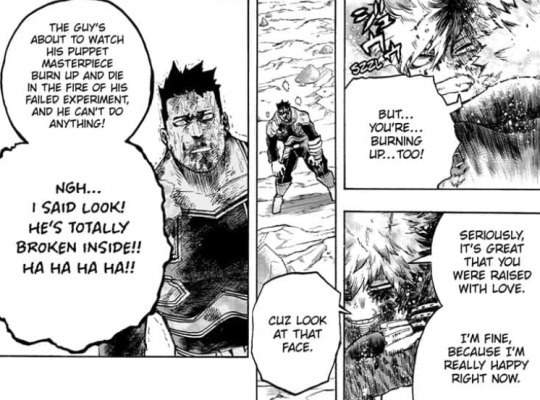
Above you can see the English translation having Shouto say “But... you’re... burning up... too!”
For comparison, here is this same part in Japanese:
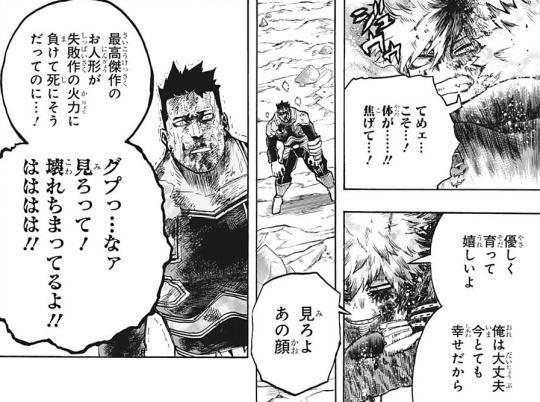
Starting with Shouto’s line, we got「てめェ。。。こそ。。。体が。。。焦げて。。。!」
This line already broke itself apart! How nice.
「てめェ ; temee 」-> you
「こそ ; koso 」-> for sure; emphasizes preceding word
「体 ; karada 」-> body
「が ; ga 」-> subject marker particle
「焦げて ; kogete 」-> to burn; to get burned (the dictionary form of this is 「焦げる」(kongeru), the te-form is used here to leave the sentence trailing)
= “YOUR body... for sure… will… get burned…!”
The reason I’m saying this line is so important is the emphasis on the “you” part through the usage of koso. The general content of the sentence already tells us this, but that emphasizing nuance doesn’t exist in English (unless you bold, italicize, and underline it). The line is important because we’re shown someone who is in the process of being burned alive, and yet his worry is on the person trying to kill him rather than anything else. He isn’t trying to argue with him, isn’t trying to protect himself - he’s simply saying: this is hurting you. It’s interesting because in the eyes of those around him, Shouto is the one hurting the most. But to him, it’s Touya who is hurting the most. To him, this isn’t the hero-to-be Shouto being fought by the villain Dabi. This is big bro Touya hurting himself for the sake of getting at their awful dad. And little bro Shouto is only thinking about his big bro.
Now for Dabi’s response, we get the line that particularly stuck out to me as far as the English translation goes: “Seriously, it’s great that you were raised with love.” What? If you read the fan translation, you might remember this line as “You’ve grown up to be so considerate - I’m happy for you little bro” - so which one is more correct? If you guessed the fan translation then, unfortunately, you are correct!
The Japanese line reads 「優しく育って嬉しいよ」
「優しく ; yasashiku 」-> ; tender; gentle; kind (adverbial form of「優しい」(yasashii))
「育って ; sodatte 」-> to be raised; to grow up; (te-form of「育つ」to indicate reason & means (this part results in the second part of the sentence))
「嬉しい ; ureshii 」-> happy; glad
「よ ; yo 」-> sentence ending particle; shows emphasis
= “I am glad because you grew up kindly”
First of all, an adverb is nothing other than an adjective that is directly affecting/describing the verb it precedes. So to understand that in reference to this sentence, you can ask the question “how was he raised?” - with the response being “kindly.” If you wanted to say “raised with kindness” on the other hand, you would have to turn the adjective into a noun. That part of the phrase would then be 「優しさで育って」As you can see, that’s not what it says in the original version.
More importantly, the word “love” is not part of this, so I don’t know why that word is used here. It really gives off a wrong understanding of what is actually being said here. The official translation makes it sound like Dabi is saying “I’m glad you were raised with love, while I wasn’t” sort of like a complaint?
We still don’t know exactly what Touya’s upbringing was like, but we do know that things gradually got worse over time, so with the assumption that he was raised in a more positive (not good, just better in comparison) environment than Shouto, the English statement then doesn’t make sense since he was “loved” too for a long time.
Besides, he is saying that in direct response to Shouto displaying his worry for Dabi, which says nothing about how he was raised but everything about what kind of person he is (a kind one).
Furthermore, it leaves out the part where Dabi says he’s happy about this. Instead, he just says “it’s great” - which is more something used when you can acknowledge a situation being good for someone else, even though you don’t have any particular feeling about it. It’s very objective, yet in the original, he is stating his emotions with this.
The official translation, in my opinion, just ends up turning the two against each other (more specifically turning Dabi against Shouto), when in reality, Dabi is happy that Shouto shows compassion for him here, despite Dabi currently trying to kill him. In other words, he is surprised by Shouto’s concern for him and happy to be proven wrong about him.
Next, we got「俺は大丈夫今とても幸せだから。」
「俺 ; ore 」-> I
「は ; wa 」-> topic marker particle
「大丈夫 ; daijoubu 」-> alright
「今 ; ima 」-> now
「とても ; totemo 」-> very
「幸せ ; shiawase 」-> happy
「だから ; dakara 」-> because (indicates a reason for something)
= “I’m alright, I’m really happy now, so...”
There are two things to note here in relation to the previous phrase. First of all, notice how both phrases include the word happy. In the first phrase, the Japanese word is ureshii, whereas in this phrase it’s shiawase. Once again, this is a question of nuance.
Ureshii is more of an immediate feeling that you feel in that exact moment. It’s a feeling that isn’t going to last forever (for example the joy you feel when you receive a gift).
Shiawase, on the other hand, is a long-term happiness.
The way to interpret why he is using both these terms is that he uses ureshii as his reaction to Shouto showing that he cares. He most likely didn’t anticipate for Shouto to say something like that, so signaling his concern for Dabi made the latter feel joy in that very moment.
So what about the happiness he talks about in the second phrase, how is it different from the first one? Clearly, Dabi is not exactly someone you would describe as happy when looking at the overall picture. I think one possible explanation as to what the shiawase here refers to is that Dabi has accepted his situation. While it wouldn’t be accurate to describe his state as one of having moved on from the past - clearly - at the very least, through admitting to his past and having distanced himself from that dark place, he has been able to now be in a better situation, where he is allowed to just live rather than trying to prove himself to someone day after day.
The second thing to note is that you might be wondering why I ended the sentence with “...” when the official translation is “I’m fine, because I’m really happy right now.”
Well, it’s kind of an odd sentence, isn’t it? The sentence as it is right there is just giving us a reason. But a reason for what? In Japanese, it’s okay to omit the main clause (the phrase that would follow after this to explain what you just gave a reason for) when it’s obvious what you’re talking about.
This confused me for a little bit until I thought about what sentence came before this one. Right before this Dabi says “I’m glad you were raised kindly.” The sentence we’re looking at right now is an extension of that. And what came before that sentence?
Shouto saying: “Your body will burn too.”
See what I’m getting at?
As explained before, Shouto is essentially telling Dabi “I know you want to kill me, but this is going to kill you.” Now if you add Dabi’s two phrases to that, you get his response as “I’m glad that you’re so considerate. That makes me really happy, so it’s alright if I die.”
Many people have pointed out before that Dabi doesn’t care about whether or not he will make it out alive and this is essentially him confirming just that. His only goal is to ruin Endeavor and knowing he is doing that is enough for him to accept death.
He then continues to explain that joy of his with the next sentence:「見ろよあの顔」
「見ろ」-> look (volitional form)
「よ」-> adds extra emphasis after volitional form
「あの」-> that
「顔」-> face
= “LOOK at that face!”
With his goal being all about destroying Endeavor, seeing this man look so defeated right there is the first proof for Dabi that his plan has worked out. While he doesn’t know yet what the actual consequences for Endeavor are going to be after this, he certainly has damaged him.
The next line reads:「最高傑作のお人形が失敗作の火力に負けて死にそうだってのに。。。!」
「最高傑作 ; saikoukessaku 」-> masterpiece
「の ; no 」-> hierarchy particle (the word before is the general noun, the word after the specific noun)
「お人形 ; oningyou 」-> doll
「が ; ga 」-> subject marker particle
「失敗作 ; shippaisaku 」-> failed creative work
「の ; no 」-> particle to indicate possession, works like an apostrophe
「火力 ; karyoku 」-> firepower
「に ; ni 」-> indirect object marker
「負けて ; makete 」-> being defeated (te-form because another verb follows)
「死に ; shini 」-> going to die
「そうだって ; soudatte 」-> I’m saying it’s so
「のに ; noni 」-> shows disappointment (“If only that weren’t the case”)
= “I say it’s a shame that the masterpiece doll is about to be defeated and die by the firepower of the failed creative work.”
A lot of people take issue with Dabi yet again referring to Shouto as a “doll” here. Obviously, that isn’t a nice thing to say, but please keep in mind that Dabi doesn’t really know Shouto and with that also doesn’t know how Shouto feels about Endeavor. All Dabi sees is Shouto being a hero-to-be, just like Endeavor has planned. Keep in mind that Dabi used to be in Shouto’s shoes, which makes looking at Shouto be like looking in a mirror and seeing young Touya trying so hard to be what his father expects of him, yet failing over and over again. They were both born for that selfish purpose. They were never born to be people, but only born to be what their father needs them to be. And now that Dabi has broken free from that role, it’s natural for him to describe Shouto’s position as such to emphasize it in case the others haven’t understood that this is the reason for their existence and them being right there in that exact moment.
The final part says「グプっ。。。なァ見ろって!壊れちまってるよ!!ははは!!」
「グプっ ; gupuu 」-> special effects sound (I will explain this one in a second)
「なァ ; naa 」-> when placed at the start of a sentence it’s an attention seeker, kind of like a “hey!”
「見ろ ; miro」-> look (volitional)
「って ; tte 」-> to say (in casual conversation this can be used to repeat what one has just said to stress one’s own quote; can show frustration)
「壊れちまってる ; kowarechimatteru」-> be broken (unintentionally; regretfully)
「よ ; yo 」-> sentence ending particle to show emphasis
「ははは ; hahaha 」-> laughing sound
= “Hey, I said LOOK! He is completely broken, hahaha!”
As mentioned in the translation comparison for the last chapter, the chimatteru indicates that the verb it attaches to has happened unintentionally or has yielded regrettable results. We know that it is Dabi’s intention to hurt Endeavor - so him being broken is neither unintentional nor is it regrettable to Dabi.
So in this case it’s not so much about how Dabi feels. Instead, it’s probably more fitting to say that it’s about Endeavor. This situation has broken Endeavor (which is regretful), even though it had never occurred to him that the past could come back to haunt him (he has not intended for this to happen).
[edit because someone pointed out that (as mentioned for the 292 comparison) chimatteru can also be used to indicate something has been done completely, so in this case he is saying Endeavor is completely broken]
Now for the part that I neglected before: the special effects sound gupuu. The reason I have been holding off an explanation is simply that it’s not necessarily that important for the sentence, however, when I looked this up this was the result:

Yes, you’re reading that correctly: *slurp*
I had a good laugh about that. The holy trinity of the slurping brothers is complete (albeit Dabi doesn’t have the noodles to go with it)
Anyway, back to the serious stuff!
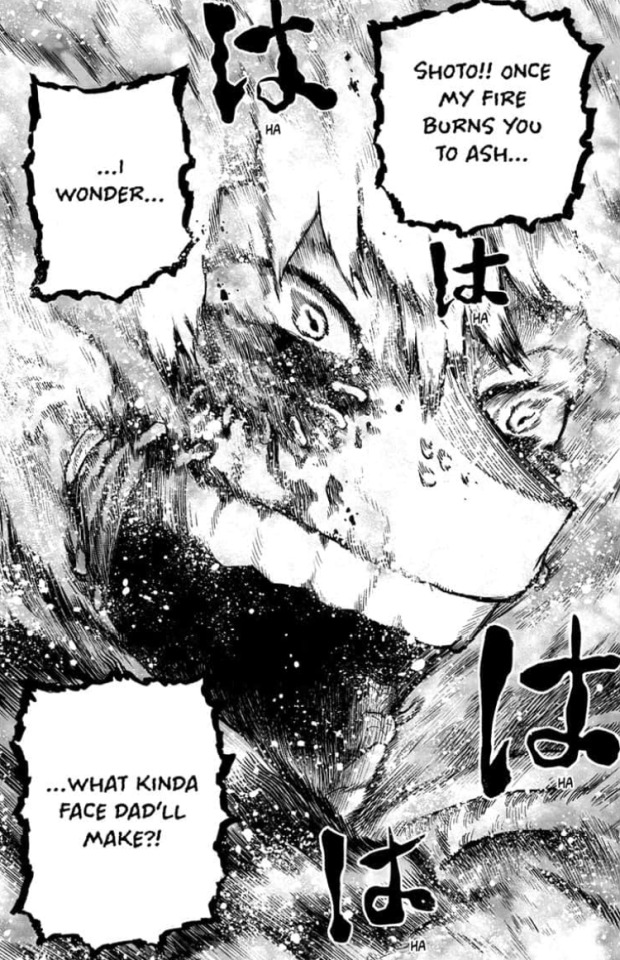
Next, we get this big panel of Dabi with the three speech bubbles. Notice that there are several ha to indicate that he is laughing.
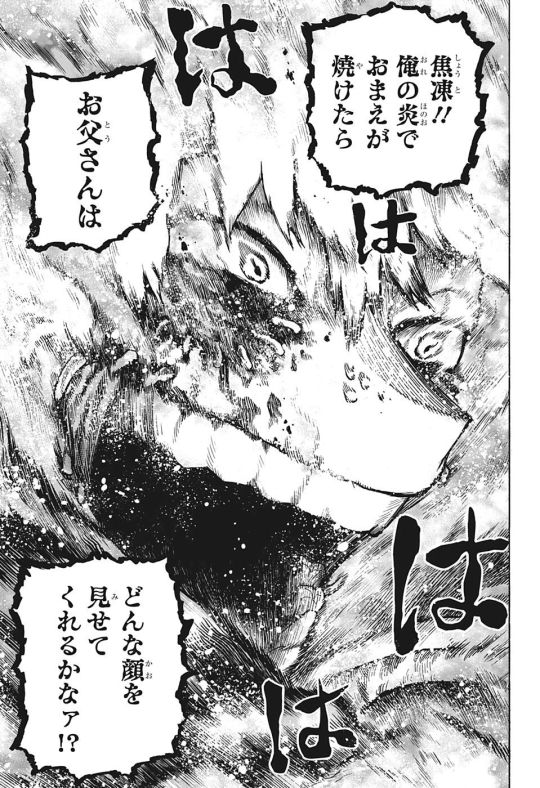
The speech bubbles all put together read:「焦凍!!俺の炎でおまえが焼けたらお父さんはどんな顔を見せてくれるかなァ!?」
「焦凍 ; shouto 」-> Shouto
「俺 ; ore 」-> I
「の ; no 」-> particle to indicate possession, works like an apostrophe
「炎 ; honoo 」-> flames
「で ; de 」-> by
「おまえ ; omae 」-> you
「が ; ga 」-> subject marker particle
「焼け ; yake 」-> to burn
「たら ; tara 」-> when (focuses on the results that can come from this first part)
「お父さん ; otousan 」-> dad
「は ; wa 」-> object marker particle
「どんな ; donna 」-> what kind of
「顔 ; kao 」-> face
「を ; wo 」-> direct object marker particle
「見せて ; misete」-> to show (te-form to connect to the next part)
「くれる ; kureru」-> something was done for the speaker (being shown)
「かなァ ; kanaa 」-> I wonder
= “I wonder what kind of face dad will show me, when you get burned by my flames, Shouto!?”
The official translation added the “burn you to ash” part, which just adds more harshness to this than there already is. I’m not exactly opposed to that as I do recognize that he is being harsh here, however, this overall theme of adding words to make the villains sound harsher is just not what a translator is supposed to do so it is important to point it out.
Also notice the kureru, which is used when something was given to or done for the listener (i.e. a favor). Previously, Shouto has pointed out that Dabi would not survive his attempt at burning Shouto, either, and yet here he is wondering specifically what face Endeavor will show him. He isn’t just wondering what face this man will make, but what his reaction would be that his own failure has killed his masterpiece.
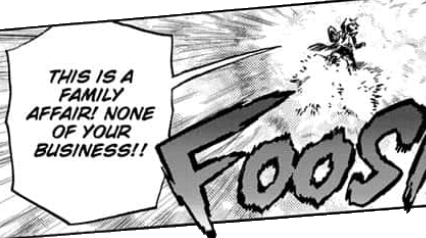
After Deku interferes we get this panel of Dabi and this is where the conversation between him and Shouto ends and his speech to Deku starts.
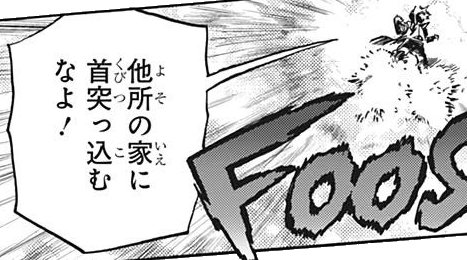
The Japanese version essentially says the same as the translation:「他所の家に首突っ込むなよ!」
「他所」-> another place; outside (one’s family or group)
「の」-> particle to indicate possession, works like an apostrophe
「家」-> family
「に」-> in
「首突っ込む」-> expression to poke one’s nose into another’s affair; lit.: “to thrust one’s neck into something”
「な」-> sentence ending particle; expresses emotion/sentiment
「よ」-> sentence ending particle; shows emphasis
= “Don’t stick your neck (nose) into other people’s family!”
After this, we get the part where Deku gives his speech with the “And guess what?! You’re not Endeavor!” part that was supposed to… reach what exactly?

Someone pointed out that this wasn’t supposed to be an “It’s your power!” 2.0 speech, because with Shouto, Deku wanted to get to him and help him. With Dabi, on the other hand, he is saying (and he literally is saying this) that Endeavor is trying to be better. And Dabi not being Endeavor means that Dabi is not trying to be better. That, in turn, means that Deku is watching this Endeavor, the one that is trying to be better, but someone like Dabi who isn’t trying isn’t something worth watching.
Anyway, regardless of what the point of that phrase was, Dabi’s reaction is mocking this obvious statement
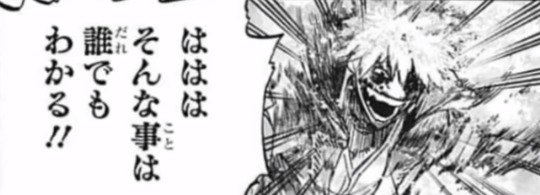
The Japanese line says「はははそんな事が誰でもわかる!!」
「ははは ; hahaha 」-> laughing
「そんな ; sonna 」-> such
「事 ; koto 」-> thing
「が ; ga 」-> subject marker particle
「誰でも ; daredemo 」-> anyone
「わかる ; wakaru」-> to understand
= “Hahaha, anyone understands such a thing!”
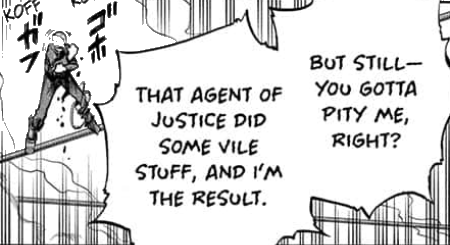
Continued by this part.

The first line here says「でも俺はかわいそうな人間だろ!?」
「でも ; demo 」-> but
「俺 ; ore 」-> I
「は ; wa 」-> topic marker particle
「かわいそうな ; kawaisou na 」-> pitiable; poor
「人間 ; ningen 」-> human
「だろ ; daro 」-> don’t you think?
= “But I am a pitiable human, don’t you think!?”
What’s interesting to note about this line is the use of ningen. Normally, you would more likely use the word「人」(hito), meaning person, when you put another word in front of it. After all, when you talk about another person (much like I am using the word right now) it’s obvious they are human, so you wouldn’t need to use the word human.
With that, Dabi specifically using the word human here is done in order to humanize himself to Deku. Not only is he asking “hey, don’t you pity me at least a little?” but rather he is saying: “I get that you think I’m just some low-life villain, but I am a human being with valid feelings, so don’t just ignore them because you don’t see me trying.”
Again - Dabi chooses his words carefully and this is no exception.
If you paid extra close attention, you might have noticed that the word kawaisou gets used again. But did you spot the difference? While in the first example the word is written in kanji as 「可哀想」now it’s completely written in hiragana. Why is that? You might wonder, and I did too. Keep in mind that the first time the word gets used here (written in kanji), Dabi is referring to Shouto. This time (written in hiragana) he is referring to himself. Kanji are generally used because it makes texts easier to read since there are no spaces in Japanese. Much like the rest of us, Japanese people are also born with zero kanji knowledge and learn about them as they grow up. Because of this, books for children tend to just be in hiragana (the letter Kota writes to Deku thanking him for having saved him is also written in just hiragana) so they can easily read them. With that, a text in all hiragana gives off a more childish, cute, innocent kinda feel.
Obviously, in spoken Japanese, you can’t hear that he is saying this word in hiragana. But we know that he is. So aside from him using the word human to make him more, well, human, he is also saying the word pitiable in an innocent way, which furthers the image he is trying to create of himself; that of an innocent human being that has been wronged. Because clearly, someone has to help the heroes see that villains are also people. As mentioned before, this is a common theme of the League of Villains and has most recently been brought up by Toga’s question to Uraraka of whether or not the heroes saw Twice as a person. Dabi is, in a way, asking that same question, just with several exclamation marks.
The second line says「正義の味方が犯した罪それが俺だ!」
「正義 ; seigi」-> justice
「の ; no 」-> particle to indicate possession, works like an apostrophe
「味方 ; mikata 」-> supporter
「が ; ga 」-> subject marker particle
「犯した ; okashita 」-> committed
「罪 ; tsumi 」-> crime
「それ ; sore 」-> that
「が ; ga 」-> subject marker particle
「俺 ; ore 」-> I
「だ ; da 」-> casual form of です (desu); be; is
= “The crimes committed by the champion of justice: that’s me.”
That first part seigi no mikata is sort of a set expression, but I wanted to break it down so you can see what the actual words are. It’s generally translated as champion of justice, knight in shining armor, crime avenger, or hero. Hero is obviously not the right translation here, since they just use the word hero for the profession. Champion of justice is just the closest to the actual words, hence I chose that translation.
The official translation is once again being biased with this sentence, this time though not so much to make the villains look worse, but to make a hero look less bad. While the Japanese version says that this “champion of justice” aka Endeavor has committed crimes that resulted in Dabi’s existence, the translation changed it to “did some vile stuff” which is seriously downplaying the fact that a Pro Hero, whose job it is to fight criminals, is actually a criminal himself! It’s just yet again a very odd change to make, especially given the fact that we know that Endeavor has committed crimes. So why make it sound like less here?
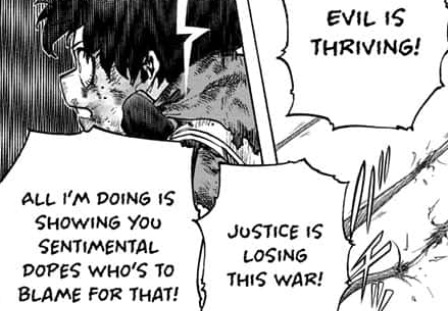
Okay, so you might be confused about this line if you read both the fan translation, as well as the official translation.
Again, the official translation says “evil is thriving” - the fan translation, on the other hand, says “evil will no longer prosper.”
To opposite meanings for the same short phrase. Why is that?
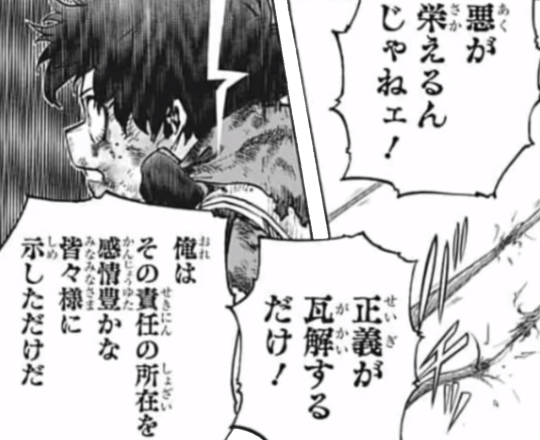
You see, the first line says「悪が栄えるんじゃねェ!」
「悪 ; aku 」-> evil
「が ; ga 」-> subject marker particle
「栄える ; sakaeru 」-> to prosper
「んじゃねェ ; n janee 」-> “isn’t it” (see explanation below)
= “Evil will prosper, won’t it?”
The reason for that confusion is that last part, n janee, because its meaning depends on the context, and with that, in cases like this, it’s less obvious which it is.
This is a rougher way of the casual n janai, which is a more casual way of no janai, which is a more casual form of no de wa arimasen. Or in simple terms: it’s very casual.
So what does it mean? Like I said, the meaning depends on the context.
The no is an explanatory particle and when paired with janai can be used for when you express an opinion, whilst seeking the listener’s opinion.
So you can treat it as a “isn’t it” in an affirmative sentence (when you express your opinion or talking about probability), but you can also use it to negate a sentence (hence the two opposite translations). The former can also be used when you’re making a point.
Knowing that it’s pretty much down to context, we have to ask what makes more sense. Is Dabi saying that evil will prosper, or is he saying evil doesn’t prosper?
To put this into context, you have to look at the surrounding sentences. Prior to this one, Dabi mentioned that he is the crimes of the hero system. In the next phrase, he talks about justice collapsing. Because of that, I think “evil will prosper” is a more accurate translation as justice collapses as a result of evil - unless you interpret evil as being about the heroes.
Anyway, the second line says「正義が側板するだけ!」
「正義 ; seigi 」-> justice
「が ; ga 」-> subject marker particle
「側板 ; gakai 」-> collapse; downfall
「する ; suru 」-> to do (turns the noun it attaches to into a verb)
「だけ ; dake 」-> only
= “Justice will only collapse!”
If you look back at the official translation, it says “Justice is losing this war!” Meanwhile, the Japanese version doesn’t mention the words losing or war. While they still somewhat say the same thing, losing a war doesn’t inherently lead to irreversible, long-term effects. Instead, this situation is about more than just losing this war. The entire system is taking a fatal blow from this. Not even so much from this war, though. The reason Dabi is so certain that this will be the downfall for justice is that how are people supposed to still trust in this justice system when those that are supposed to defend it are criminals themselves? It’s more of a natural consequence resulting from a system that has been corrupt for far too long - the exposure is simply what will put an end to it.
The third line in that part is「俺はその責任を感情豊かな皆々様に示しただけだ」
「俺 ; ore 」-> I
「は ; wa 」-> topic marker particle
「その ; sono 」-> that
「責任 ; sekinin」-> duty; responsibility
「を ; wo 」-> direct object marker
「感情 ; kanjou」-> emotion
「豊かな ; yutaka na」-> extremely; very
「皆々様 ; minaminasama」-> everyone
「に ; ni 」-> to
「示した ; shimeshita」-> pointed out; showed
「だけだ ; dake」-> only
「だ; da 」-> casual form of です (desu); be; is
= “I only pointed this responsibility out to all you very emotional people.”
What irked me about this phrase in particular in the official translation was yet again the choice of words. I get that Dabi has a rough way of speaking. But sometimes, he chooses to use polite words and that shouldn’t be erased.
So when the official translation makes him say “All I’m doing is showing you sentimental dopes who’s to blame for that!” It’s just a rude phrase. But in Japanese he says minaminasama. You might be familiar with the word minna or minna-san, with the san in the latter example being a polite suffix (kind of like Mr./Mrs.,...). Sama is similar to that but even more polite. So minaminasama is about as polite as you can go. There might not be a direct English equivalent to that level of politeness, but I think we can all understand that “dopes” is not a correct translation here.
The responsibility/blame part goes back to what Deku said to him. “You aren’t Endeavor” - no, he isn't. And no, he isn’t exactly trying to be better. But that kind of mentality only ignores the obvious fact that this all could’ve been prevented, had it not been for Endeavor and his own selfish goals. It was a hero - the “champion of justice” - that committed crimes just like a villain. But it’s unheard of for a hero to do such a thing. Society doesn’t get shaken at its core when it hears about a villain committing a crime. A hero, on the other hand, being found guilty of a criminal record, will lead to people doubting the integrity of heroes altogether and that is not Dabi’s doing. All he does is share the truth.
To round this speech off, we get one last phrase:
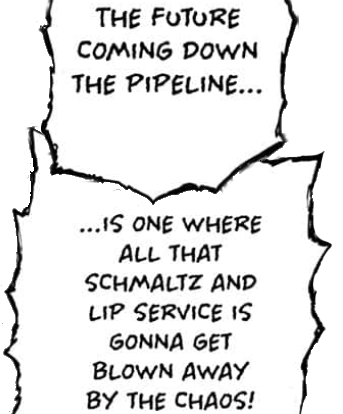
“The future coming down the pipeline… is one where all that schmaltz and lip service is gonna get blown away by the chaos!”
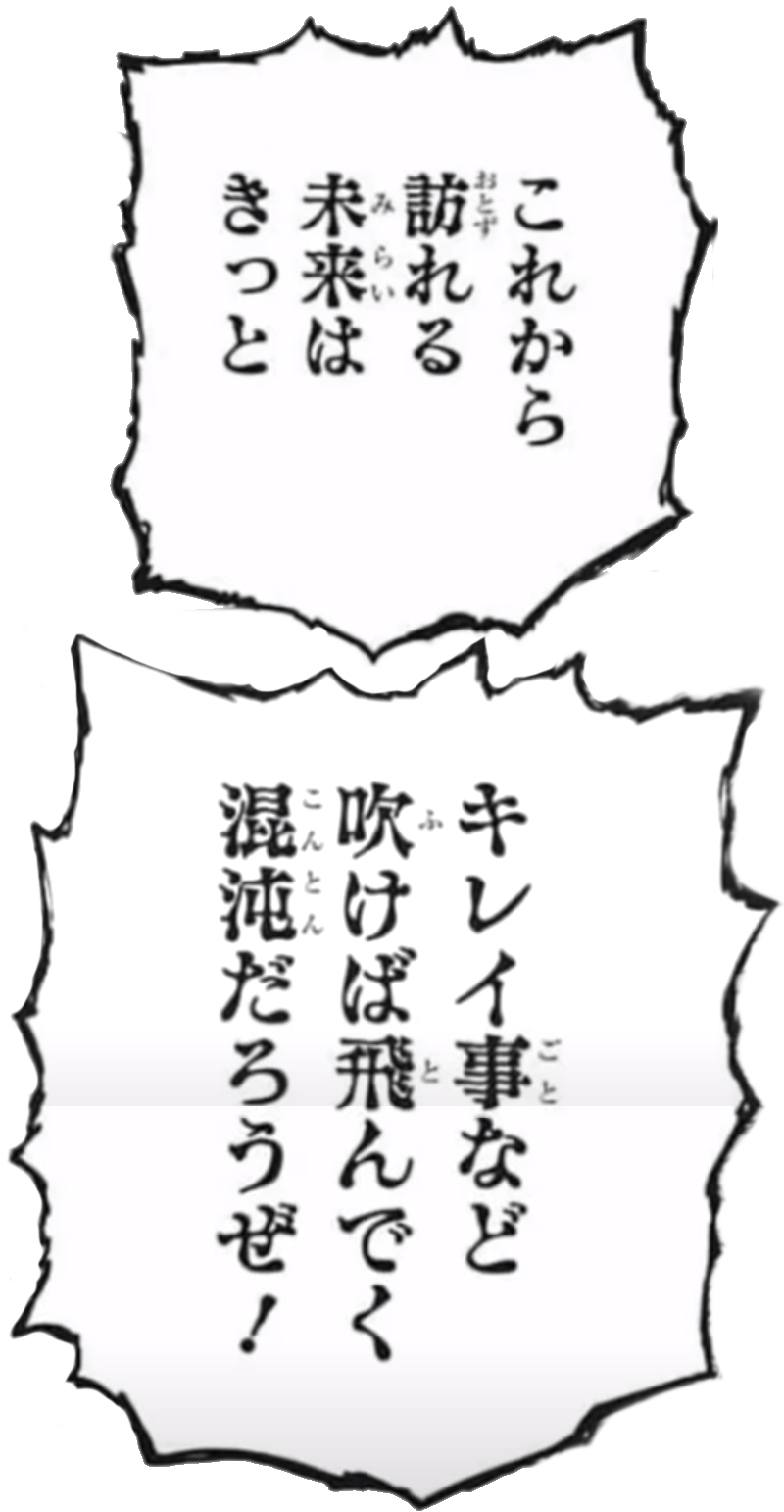
The Japanese line says「これから訪れる未来はきってキレイ事など吹けば飛んでく混沌だろうぜ!」
「これから ; korekara 」-> from now on; after this
「訪れる ; otozureru 」-> to arrive
「未来 ; mirai 」-> future
「は ; wa 」-> topic marker particle
「きっと ; kitto 」-> surely; without a doubt
「キレイ 事; kireigoto」-> glossing over; lip service
「など ; nado 」-> such as
「吹けば ; fukeba 」-> to blow (conditional form of fuku)
「飛んでく ; tondeku」-> to go flying (short for tonde iku)
「混沌 ; konton」-> chaos
「だろう ; darou」-> it seems; don’t you think?
「ぜ ; ze 」-> ending particle for emphasis (more casual/ruder version of yo)
= “Surely, if things like this lip service get blown over, the future coming after this will be chaos flying around.”
In Japanese, there are several conditional forms. The ba form, as used here in fukeba, is used when the preceding clause expresses a condition, which results in natural consequences. In this case, something happens in case pretty things get blown over.
Mirai is one of the words you can use to talk about the future in Japanese. This word is more intangible and more general rather than being about one specific event or person, so everyone will be affected by this.
And with that, we have made it through all of his speech from this chapter, congrats!
Something you may have noticed is that there are plenty of particles you can use at the end of a sentence, usually for emphasis. One of the most common ones you find throughout the chapter are yo and ze. Yo is a pretty standard one to show emphasis, whereas ze is more of a colloquial version of yo that has an assertive feel and is therefore usually only used when speaking in very casual conversations or to someone of lower social status than you. Dabi has used this on Endeavor before and is now also using it on Deku - aka his opponents.
Going back to the start of the chapter when Dabi is mainly focused on Shouto, though, he ends most of his sentences with naa. As mentioned before, this particle is used to express emotions/sentiment.
He also uses that during their first on-screen interaction during the summer camp. While I do think that Dabi is mainly still only seeing Shouto as an extension of Endeavor, I do think that there is also a part of him that does see himself in him and that can somewhat sympathize with him. He isn’t being as rough on him overall (verbally that is), and instead is trying to come off as more emotional, possibly just to appeal more to him.
To sum it up, there are a lot of things that just get lost in translation due to nuances that don’t exist in English. More often than not, though, the villains are being given harsher words, whereas anything related to heroes is softened. Dabi is constantly shown to be someone who puts great care and thought into the words he uses, so there is a lot of that emotional intelligence that gets neglected in the translation and then makes him seem more like someone on a random mission rather than someone who has put genuine thought into this.
There are still so many people in the fandom who, for some reason, think Dabi is in the wrong and irredeemable for having killed thirty people, whilst having the same stance as Deku in thinking that Endeavor is much better because at least he is trying.
While they should both be held accountable for their actions, Dabi has a good point when he said that heroes are to blame for his existence and that their crimes are what will ruin the justice system and not him.
Best Jeanist’s reaction to this whole situation was complaining that Dabi uses his personal past to shed a bad light on the heroes, which summarizes that exact problem of the hero society: That heroes are more concerned with their own image than actually being heroes who go above and beyond to bring about peace and safety.
Seeing Shouto’s reaction, being concerned about his big brother rather than himself, is at the very least giving some hope that at least one person on the hero side is able to see beyond the villain exterior and see them as a human-being - without needing a long speech for it.
We’ll have to wait and see how this is going to continue, but in more likeliness, the official English translation will continue to include its bias.
If you’ve made it this far - thank you so much for reading! This post was filled with a lot of information and trust me when I say some of these lines almost broke me as I tried to understand them. I hope I could clarify some parts of the chapter, though, specifically Dabi’s character, since the official translation loves to change his character.
#bnha#dabi#293#translation#meta#boku no hero academia#bnha 293#todoroki#shouto#touya#mha#my hero academia#mine#japanese
672 notes
·
View notes
Note
Halo! Here's a reddit link to information and research papers about onmyodo consolidated by other people and a link to an overview. Tried to summarize below bits and pieces that may be relevant to jjk (and which I tried to understand to the best of my abilities :P )
I think this will be the last time I write such a long-ass ask again, my apologies
About cursed spirits and mono
Court onmyojis in Heian used divination to find out the cause of things like curses, strange events (kaii), natural disasters, illness, why your dog is barking at a seemingly empty spot (answer: Megumi's divine dog is barking back) and so on. Strange events were referred to as mokke (物怪) or mono no satoshi (もノノサトシ) and believed to be omens of calamity that were caused by mono or "things" which could be anything like the curses of gods or something from the Imperial mausoleums. Furthermore, during the rule of Emperor Kanmu from end of Nara to early Heian, the Ritsuryo system of government began to crumble as imperial rule changed hands and political victims were feared as onryō (怨霊) that caused disease or death to the Emperor's nearest relatives (but not the Emperor himself). The fear of strange phenomena spread through the aristocrats and became commonplace. Onymojis were believed to be able to deal with the curse of mono as well (otherwise it's off to the chopping board for their jobs (and lives) they go, chop chop). And so the Imperial Court funded them to perform quelling rituals and ceremonies to appease gods, clear away damages by insects, pray for harvests and prevent the spread of epidemics (which ironically was exacerbated by the court's overspending and large-scale deforestation but that's another story). For individual cases like the spirits of living persons (ikiryō or ikisudama), or spirits of dead people (akuryō, ryō, onryō, shiryō or bōkon), onmyojis might determine that spiritual energy or evil spirits (mono no ke) was the cause but mikkyō genja (験者) or ritualists were the ones to subdue it by incantations. JJK cursed spirits resemble mono no ke in that they cannot be seen and may harm humans. Whereas jujutsu sorcerers are more like genja ritualists (complete with flashy kamehameha bombs) (and besides being cursed).
Lifespan rituals
The most popular theory for Sukuna's fixation with Megumi has already been covered by this blog owner with additional info on the Ten Divine Treasures. Another theory is that Sukuna could have been aiming for a higher level of enlightenment. Besides the Shinto-Buddhism angle, Onmyodo also has its own set of rituals concerning life and death. Onmyodo is basically a system of divination and techniques that focuses on worldly benefits and has no vision of the world after death. The rituals were instead based on the Chinese beliefs in honmyō (本命), Zokushō (属星) or the realm of the dead (冥界) and by the end of Heian, there were more than forty Onmyodo rituals to pray for the individual health and longevity of aristocrats (commoners: eat the rich 👎). For the terms honmyō and Zokushō, the closest meaning I can give without being too horribly misleading would be the life/destiny that you are born with according to your birth year, zodiac, constellation and so on. The most popular ritual was Taizan Fukun sai (泰山府君祭), which originated around the beginning of the tenth century and was closely associated with Abe no Seimei (yes that guy you keep seeing in anime). Taizan Fukun (泰山府君) is the lord of the eastern peak of Mt. Tai in China, a deity that summons the spirits of the dead and administers the lengthening and shortening of human lifespans. Twelve deities of the realm of the dead including Taizan Fukun were involved in this ritual. It was implemented on every honmyō day, but also as needed for illness, childbirth, natural disasters, and strange events. Media adaptations often depict Abe no Seimei (or other onmyojis) using the ritual for resurrection or reincarnation 😅 e.g. Tokyo Ravens, Shaman King, Onmyoji (2001). I don't think Gege will go for the same cliché trope for Sukuna but it's still interesting to know.
Seimei and Dōman (Gojo and Getou)
Anyone who knows about the folklores of Abe no Seimei 安倍 晴明 would be familiar with his eternal rival, Dōman 道満. Like Gojo who's the strongest jujutsu sorcerer, Seimei was the leading onmyoji specialist of his time. His position as the Kurōdo-dokoro onmyōji (highest-ranking onmyoji), legendary reputation and long lifespan lent to the notion that he had mystical powers due to being born from a human father and a kitsune mother. During Heian, Onmyodo referred to the organization of onmyojis under the control of high-ranking people of the same profession (kinda like the JJK elders) rather than the system of beliefs known today. Onmyōji with official status like Abe no Seimei would be kanjin onmyōji (官人陰陽師) or official onmyōji. Non-official onmyojis would include hōshi onmyōji (法師陰陽師) or priest onmyōji, who had the appearance of Buddhist priests (like how Getou was dressed as a cult leader), and presumably the control of the Onmyōdō did not extend to them. Official onmyōji, under the strict supervision of their superiors, would not have been permitted to have any connection with criminal acts such as curses. Instead, the Heian nobility turned to hoshi-onmyojis like Dōman to lay curses on their political rivals. There were many incidents involving curses within aristocratic society in Seimei’s time, and in a majority of cases the curses were placed by hōshi-onmyōji. Dōman himself had been spotted visiting a noblewoman, Takashina no Mitsuko, who employed hōshi-onmyōji to put a curse on several prominent political figures. Getou: "Let's curse each other... to our hearts' content!"
War onmyojis (and questioning of Gege's probable naming sense)
The Sengoku era treated court onmyojis poorly (ceremonies were expensive to fund). Warrior onmyodo being more practical (divining auspicious days for battle/forming alliances and exorcising evil spirits) became prominent instead. Academies that taught Confucian studies with divination and medicine as part of the curriculum flourished and the most famous was Ashikaga Gakkō (足利学校) (not as modern as Tokyo Jujutsu High though). Like Nanami and co. who became professional sorcerers, many of its students went to the battlefield as diviners and doctors. When peace returned during Tokugawa Ieyasu's rule, a few practitioners thrived by attaching themselves to powerful men. One would be Tenkai (天海) and another Kanshitsu Genkitsu, head of the Ashikaga Gakko. Being Ieyasu's bff, a temple Fushimi Enkoji (伏見円光寺) modeled after Ashikaga was built and Kanshitsu appointed as its head. Ieyasu also sponsored Kanshitsu's Fushimiban (伏見版), a publication project printed with wooden blocks. I'm definitely reaching here for Tengen and Fushiguro but I do wonder if Gege ever chanced upon those names.
🦆A Tail of Many Kamos: 鴨川, 下鴨, 鴨, 加茂, 賀茂 🦆
鴨川 - the Kamo river northeast of the Heian capital (modern Kyoto)
下鴨 - the Shimogamo Shrine (下鴨神社), a Shinto shrine dedicated to the Kamo family of kami
鴨 - the clan associated with the Kamo shrines and the famous poet-priest Kamo no Chōmei (鴨 長明) who witnessed the end of Heian. Also Bucephala albeola.
加茂 - Kamo no matsuri (加茂祭) or Aoi no matsuri (葵祭), an annual festival of Shimogamo Shrine and Kamigamo Shrine and one of the three major festivals in Kyoto, also one of the three big jujutsu clans (加茂家) in JJK. It's funny that Gege would choose a name with the same pronunciation as a real-life historic clan, which brings to the next point.
賀茂 - the formal name of the Shimogamo Shrine (賀茂御祖神社), also a once-prominent Heian Onmyoji family that died out during the Sengoku era. Thereafter, the Tsuchimikado (former Abe clan) took over their hereditary duties of keeping the calendar. Abe no Seimei's teacher was the astrology scholar (tenmon hakase 天文博士) Kamo no Yasunori (賀茂保憲). Could Kenjaku be based on Abe no Seimei as well?
The Musical Exorcist
The rock-n-roll grandpa, Gakuganji, might be based on the lesser known lute-priests called biwa-hoshi (琵琶法師) or zatō (座頭). Their musical style is referred to as heikyoku (平曲), which literally means "heike music". Accompanied by their mōsō-biwa (盲僧琵琶), the often-blind lay priests would chant Buddhist mantras, placate earth deities, perform spirit pacification chinkon (鎮魂) of vengeful spirits including onryō, communicate with the dead (Principal Yaga 😢), purify defilements haraikikyomeru (祓い清め) and border rites kyōkai girei (境界儀礼) that expel malign forces. The thesis "From Heike to Nomori no kagami" suggests that the musical practices and theories of Heike correlate with Yin-Yang principles. Which I will not further expound bcos I haz zero music theory knowledge and also this ask is far too long 😛 Hopefully Gakuganji will not remain blind to the less-than-holy intentions of the jujutsu higher-ups as the story continues.
Hello, lore anon! Thank you for compiling another stellar read!
Aaw, you'll be missed, but it's fine. Just do things and drop by if you feel like it.
Yes, onmyodo has a large influence on Japanese pop culture. Numerous manga takes their inspiration from onmyodo, jjk only one of them. Onmyouji had a very large political influence in the court. They were also a legit government position, literally civil servants back in the day.
The legend of Abe no Seimei and his rival Ashiya Douman is also famous. Abe no Seimei was said to be born from a kitsune (fox spirit) mother and human father, so he is often thought to not be fully human, hence his supernatural ability. I wouldn't be surprised if one of these characters is inspired by either Seimei or Douman; Sukuna, Kenjaku, or Tengen.
Kamo, yes, it seems that Gege actually takes the name of the clan. The fanbook said that Kamo clan arised to influence during the heyday of Heian period, the Golden age of Jujutsu. While it's lesser known, Kamo family is quite a legend too alongside Abe no Seimei in onmyoudou. As you said, Kamo no Tadayuki and his son Kamo no Yasunori has been known to teach Abe no Seimei.
89 notes
·
View notes
Note
I can definitely tell you that people have been misinterpreting yoongi's words.
So basically there was this interview (in Japanese) and he was asked what his ideal type was. 防弾少年団☆STYLE Vol.18 メンバーの意外な恋愛観とは!?理想のラブストーリーは…… <—- original interview
SUGA: 僕は性格と雰囲気。僕は決まった理想のタイプというようなものはないです。異性に限らず、印象や相手が醸し出している雰囲気で、あっこの人とフィーリングが合いそうかなということを重視しています。
The interview was in Japanaese, and when you're translating something you're supposed to translate it until the very end of the sentence. If you stop midway through the sentence it will look like this:
“I don't have any particular ideal types. I'm more interested in one’s personality and good vibes, but it's not just limited to women,…”
Of course it would seem like he's a pan if you only read his answer until that part. However, if you read his complete answer you'll get this:
“I don't have any particular ideal types. I'm more interested in one’s personality and good vibes, but it's not just limited to women, I tend to look for that aspect from any people in general.”
He wasn't hinting his sexuality, he was saying that for him, the most important thing about someone isn't how the way they look but rather their personality. Not only for his love interest, but literally any people; friends, family, coworkers, anyone alike.
Not that there's anything wrong with being a pansexual, though. Even if he is, I wish for nothing but all the love and support from the ARMYs but i really hope we could all stop using that interview to proof he's pan or bi because if you understand Japanese or read the correctly translated interview in its full context you'll realize he's not really hinting anything about his sexuality.
Hello anon!
I should have looked more carefully into that and gotten more confirmation that just whatever pops up on Twitter when you search that interview. It's a good reminder to always triple check your facts. Thank you 💜

I did ask a friend of mine whose native language is Japanese to translate as well. Just for my own personal confirmation. She isn't army and I gave her zero context, just sent her Suga's answer and asked her what he said. This was her translation:
"I don’t really have a fixed ideal type. If I were to say something, it’d be Impression and personality but that’s not really specific to just women; I look for those things in people in general."
So her translation ended up worded slightly differently than yours but essentially said the exact same thing. Man, how did that get taken so wildly out of context?! Thank you again for correcting me! Sorry it took me a while to reply, I was waiting on my friend to get back to me about it, hope you understand. I wonder if there is a better translation of the entire article out there because I would be very interested in reading it.

Does this change my opinion on if Yoongi is part of the LGBTQ+ community, lol no. Not really. I do still think he is. I will be redoing his rainbow moments post though at some point. To one, get rid of this interview moment that is mistranslated and add all the other moments I left off the first time. This translation could honestly maybe give me demisexual vibes too. Or it could simply that looks are less important to him when considering a serious relationship and it has nothing to do with sexual attraction...
No matter what his sexuality is though, even if I am wrong and he is completely straight, that is fine and the only thing I want for him in life is happiness and love in whatever form HE wants it in. 💜 Thank you again, seriously. Always feel free to correct anything I post that includes mistranslations, please. I don't ever do that on purpose and always would like to know AND know what was actually being said.
53 notes
·
View notes
Text
Kobayashi’s Maid Dragon S2 Episode 9 Notes
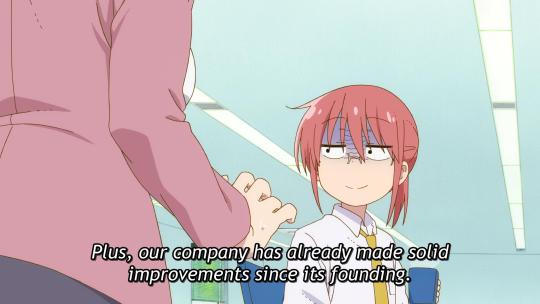
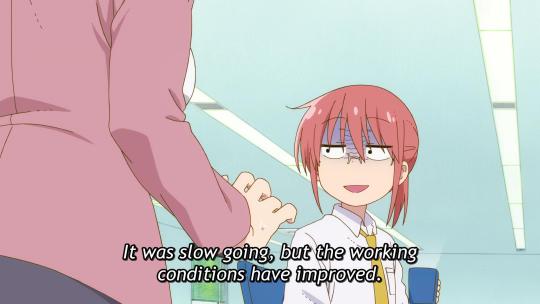
...設立から大分地盤が固まってきており、少しずつだが、業態は改善されている。
One thing to note here is that Kobayashi(‘s narration) isn’t saying the company has already made solid improvements, it’s that the company has finally established itself somewhat (as it was only founded relatively recently, and typically new companies are especially busy while trying to get off the ground) and now is starting to make improvements.
Similarly in the second sentence, it’s not “was” slow going, it’s “is still” slow going, and the working conditions “are” improving, not “have improved.”
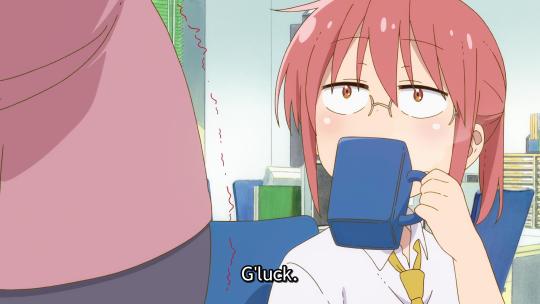
This is がんば ganba, short of course for がんばって ganbatte, which I’m sure most of you are familiar with: the (in)famous “do your best.”
I only mention it because I like this shortened version of it. Ganba!
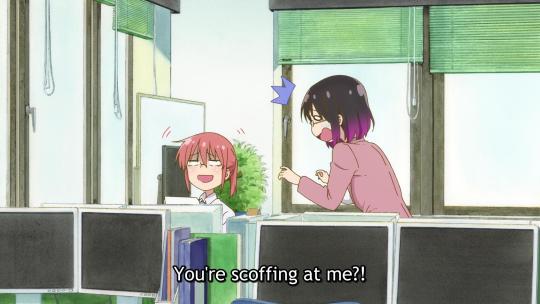
This is a fun little idiom(?)/saying: 鼻で笑う hana de warau (conjugated as hana de warawareta), lit. to laugh using the nose. It’s used to describe laughing at someone you’re looking down on for whatever reason (not necessarily in a super serious way, could just be a friend being dumb etc.; in this case it’s Elma’s being naive).
Typically it refers to like a “heh-but-through-the-nose” kind of “laugh,” but as you can see in this scene (where clearly Kobayashi is laughing with the mouth, even starting with “pff” lips) it works idiomatically even if the laughing isn’t only through the nose.
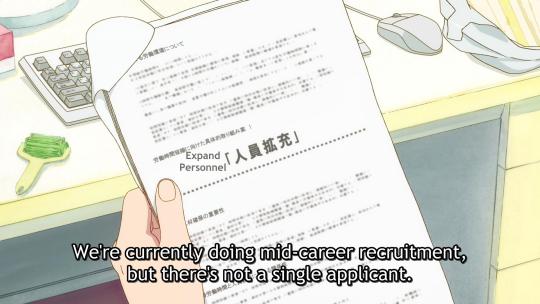
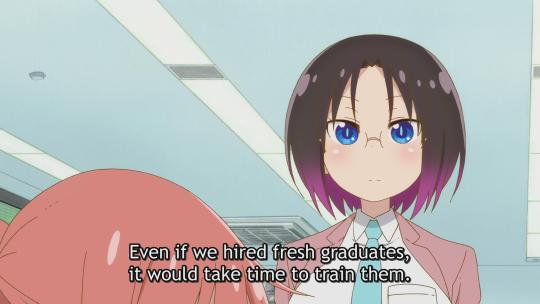
You may have heard that Japan is/was a “lifetime employment” country, where typically people would get hired right out of school and stay at that company until retirement. While that’s much less true today than it was even a couple of decades ago (and has become kind of controversial in ways), it’s still much more common of a practice than in say the US.
One result of this is that there’s a much bigger distinction placed between hiring people in spring as part of the annual graduation rush (the Japanese school year ends in March), and mid-career hiring. Typically you can’t participate in the fresh grad hiring if you aren’t one, even if you’re new to the field in question.
For larger employers (i.e. 5k+ employees), roughly two-thirds of all hirings come from fresh grads, and only small employers (<300 employees) hire more mid-careerists than people directly out of school.
Of course, this split tends to apply mostly to “standard” full time jobs, not so much part time, and is not necessarily a thing in every industry/at every company.
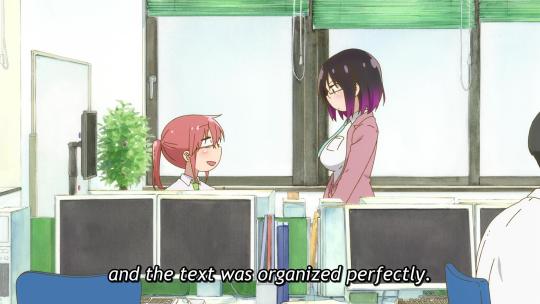
Just as a minor point of clarity, this “organized text” in Elma’s document refers to the phrase まとめられた文章 matomerareta bunshou. In a literal sense, matomerareta can mean organized/consolidated etc., and bunshou text/passages, but meaning-wise it’s more like “writing that gets its point across clearly/cleanly.”
This is a pretty big compliment and a very useful skill to have in organizations like this, as writing such that people can quickly and easily understand exactly what you’re trying to say often saves a ton of time and frustration.
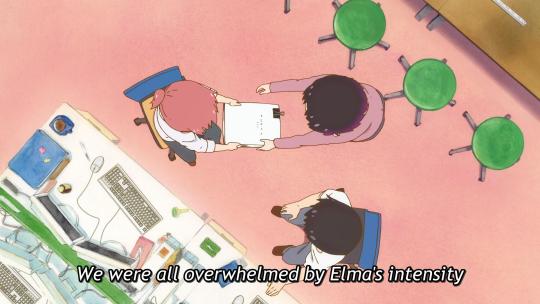
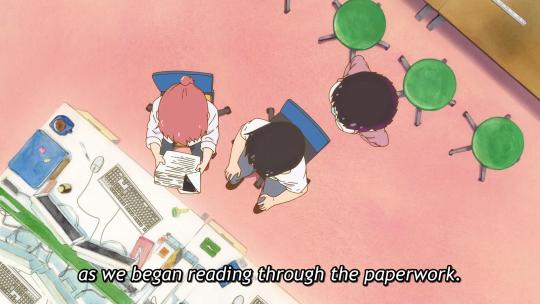
我々はエルマの気迫に押されるがままにその書類を読み始めた。
Another minor point, but where the English could imply that they were overwhelmed by Elma’s intensity through the act of reading her report, the Japanese implies more that they started reading it because of how intense Elma was being.
It doesn’t really make much of a difference either way, but it stuck out a little for me.
To justify mentioning it, I guess I’ll explain the grammar point Kobayashi uses: されるがままに sareru ga mama ni. Sareru is a generic verb/verb conjugation for having something done to you (technically here it’s 押される, to be “pushed/pressed/pressured”), and mama refers to a state, condition, or “way” (like “do it this way”).
Put together, the whole phrase is used to indicate “you” do/did something that someone else wants you to, without (meaningful) opposition. (Something similar in raw meaning but with a very different connotation would be “going with the flow.”)
If a friend says “hey let’s go do something,” and next thing you know you’re out bowling despite preferring to stay at home, this is you.
You can stick the mama ni to various other things as well to come up with a similar idea, but without the sareru the nuance may end up different.
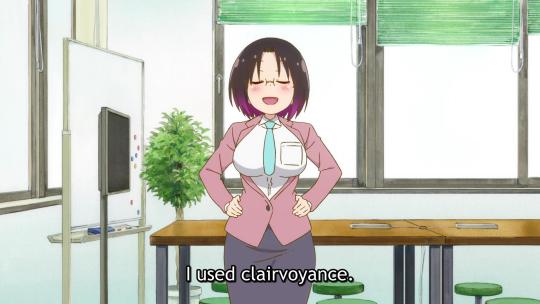
The word for clairvoyance here is 千里眼 senrigan, lit. “eye(s) [that can see] a thousand li”, li being a Chinese unit of measurement for length (shorter than a mile, but for general purposes “eyes that see a thousand miles” is basically the gist).
Despite the perhaps physical-sounding nature of the term, it does actually describe the same power as “clairvoyance” in English: being able to perceive things outside your actual range of vision, including potentially into people’s hearts and minds etc.
Hence why it’s a thousand screen display, when she updates it with tech knowledge:
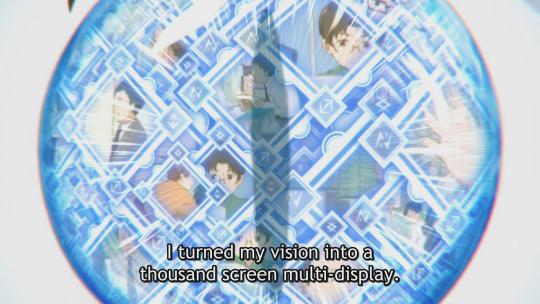
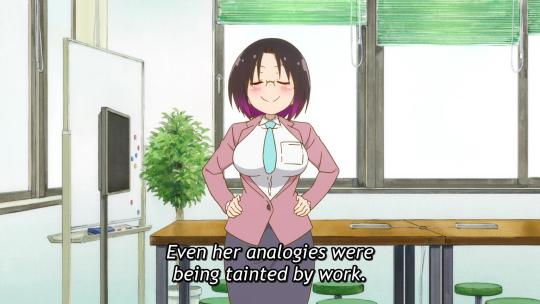
“Tainted by work” here is 職業病 shokugyou-byou, lit. an occupational disease. The “proper” definition is a disease one gets from working in a particular job, such as black lung for coal miners or even posture-related health issues for desk workers.
Additionally, it’s used colloquially to refer to noticeable habits or quirks that people in a certain profession pick up, like a baker always waking up super early or a programmer using programming lingo out of context in normal conversation. The latter being especially noticeable in Japanese, as a lot of such terms are English in origin.
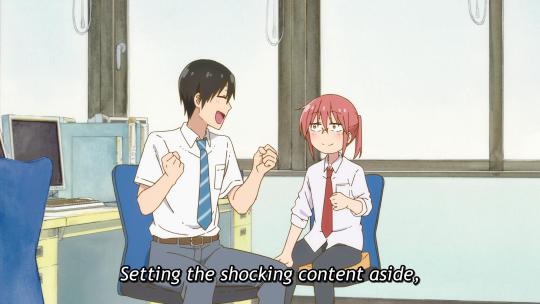
“Shocking” here is a fun word: ドン引き don-biki. “Don” here is added just for emphasis; the main meaning revolves around 引き hiki/biki, from the verb 引く hiku, meaning to pull.
The idea is that someone does/says something that you recoil from. Maybe it’s gross (“I only shower once a week”), maybe it’s mean (“They didn’t smile enough so I didn’t leave a tip.”), maybe it’s creepy (“I sent like 30 texts yesterday but still no reply.”), just anything that has you feeling like you might want to create some distance because... phew.
It’s kind of similar to the current use of “cringe” as an adjective/noun, though with less of an internet-slang feel* to it, and generally used more as something the speaker is doing rather than describing whatever/whoever is being cringe.
(*I think it started being used popularly in this way in the early-to-mid 90s, with the “don”biki variant specifically popping up around 2005.)
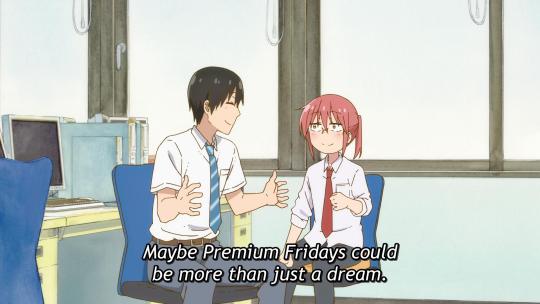
A “Premium Friday” is the last Friday of the month, where you get to leave work at 3 pm. It is largely theoretical.
The idea was created by the Japanese government as a way to reduce working hours and encourage domestic spending (boost demand), but it has not been implemented by all that many employers, and especially not many smaller employers. There isn’t, after all, any mandate or government-provided incentive for doing so.
Evidence from the places that did implement it suggests it is actually good for the economy, but good luck convincing bosses to give extra paid time off.
“Last Friday of the month” was chosen because most people get paid on the 25th each month (Japan tends to pay monthly instead of every two weeks), so it would usually be right after payday, when people are more willing to get spendy.
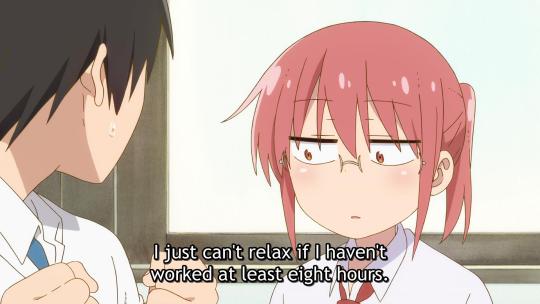
Kobayashi saying eight hours here reminded me of a “fun” fact: the typical Japanese work day is eight hours plus a one hour break. Plus a one hour break, not with. So a typical work day is actually nine hours. Most commonly 8 to 5 or 9 to 6. Not many “nine-to-fives” here.
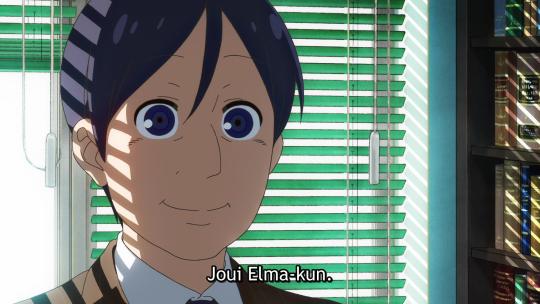
The characters for Joui are 上井, which usually read as Kamii or Uwai. It’s “Joui” because that means, when written as 上位, “superior.” As in “a superior life-form.” Like a dragon, say.
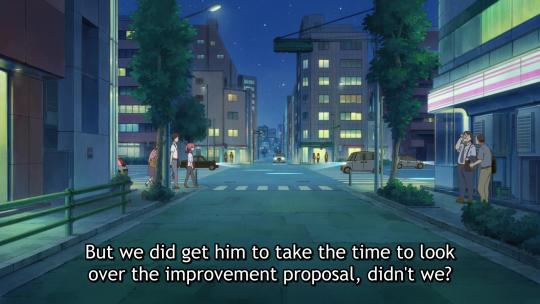
でも、ゆっくりやる事業改善案を見せてもらえたじゃない?
This one is actually kind of a critical mistake. In the English it sounds like she’s talking about the improvement proposal that Elma made and that the boss looked at. In the Japanese though, she’s talking about a different plan, one the boss showed them*, that is similar in idea but is going to take longer to be fully implemented**. So we’re being told that while Elma didn’t get what she wanted as fast as she wanted it, it is still basically going through at a slower pace.
*In ”見せてもらえた misete moraeta,” the misete vs mite means they were the ones who got shown something, rather than the ones who got someone to look at their stuff.
**Which you can tell from the ゆっくりやる yukkuri yaru, where yaru is basically “do” and yukkuri means (in this case) at an unhurried pace.
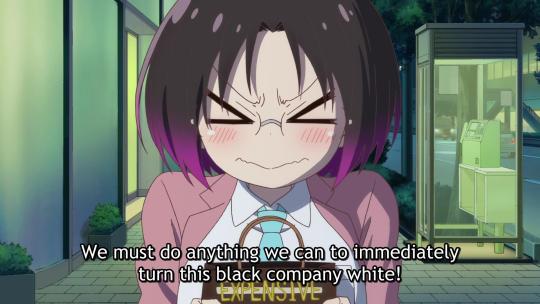
(Re previous note: Hence why she says “immediately” here.)
“Black (ブラック)” and “white (ホワイト)” in the context of Japanese employers refers to how well employees are treated: a company with good benefits/pay, reasonable levels of overtime, and feels safe to work at is “white,” while a company that has excessive overtime, often pays poorly, breaks labor laws, and allows harassment to fester is “black.”
While “white company” was created simply in contrast to the term “black company,” the latter finds its origins in front businesses for organized crime, which were called “black” in the sense of “illegal” (similar to “black market” or something being in a “grey area”). Given the international reputation of Japanese work life, you can imagine that “black company” as a term sees much more use.
There’s been some discussion about maybe replacing it due to the racial implications (especially since it uses the English word “black”), but while typically English translations drop the color for that reason (e.g. ブラック企業大賞, an “award” given to Japan’s worst employer each year, is officially “Most Evil Corporation of the Year Award” in English), it hasn’t really penetrated to the mainstream at this point.
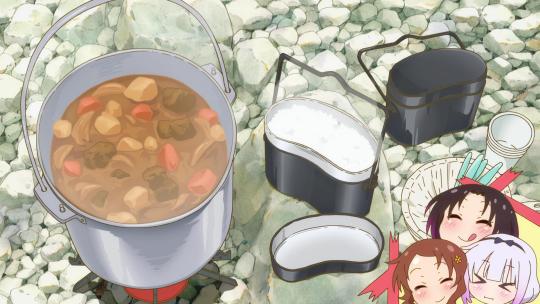
The rice there is in a 飯盒 hangou, a metal container that looks… like that, and is the stereotypical item of choice for cooking rice while camping. It has its origins in the mess kits used by the military, but these days they’re primarily marketed as portable rice cookers for camping use.
You can get round ones too, but the bean shape is very popular.
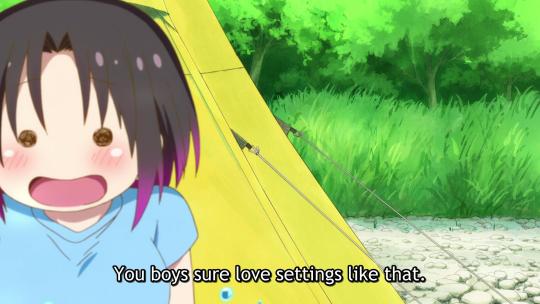
“Settings” here is 設定 settei, lit. exactly that, “setting(s).” E.g. if you open a computer program and look at the settings menu, it’ll be settei in the Japanese language settings (settei).
I bring it up here because there’s a bit of a difference in how it gets used colloquially like this. In English, the “setting” for a story typically refers to where and when it’s set. In Japanese, “setting” in that sense is usually 舞台 butai. But settei is still used when talking about fiction, just in a different, more expansive way.
Often in these cases settei is used to refer to the various conceits that provide the context in which the story takes place. In this show, for example, one such “setting” is that dragons are real: another is that magic exists. It comes up especially often in fantasy/sci-fi type stuff where there are major distinctions between that universe and the real world—not that stories in a real-world setting don’t have settei of their own, but they often are lumped into descriptions of the plot in that case (”a dragon comes to live with an office worker in her apartment”).
It also refers to the “settings” of characters, like name or age, and things like “they run a bakery that’s going out of business and are trying to save it.” Basically all the details you’d have in a character profile.
It also gets used in conversation to refer to pretend things or (basically) lies: like here, where Saikawa thinks Shouta is playing pretend with his ley-lines talk, or e.g. if someone is trying to tell you some outlandish story (“my uncle works at Nintendo…” or someone asking for love life advice for “their friend”) and you’re just like “Okay so that’s the settei here, I see.”
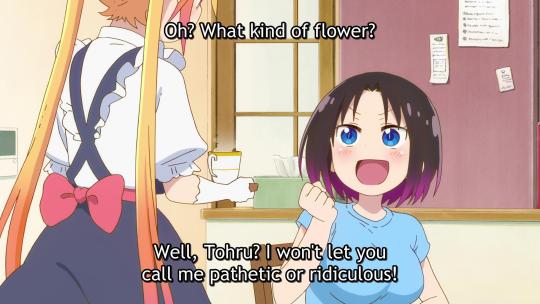
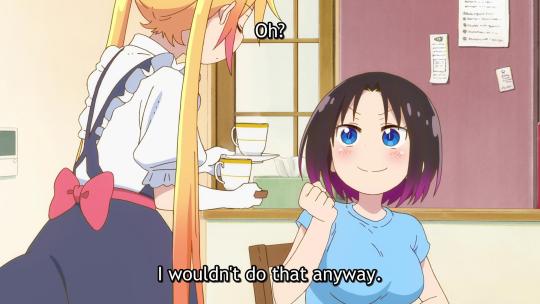
Not really a big deal, but Elma’s line here in Japanese implies she won’t let Tohru call her that anymore (see her もう mou). Tohru’s response is also more of a “I haven’t been?”, since of course she wasn’t aware of Elma’s-mental-image-Tohru tormenting Elma in the previous scene:
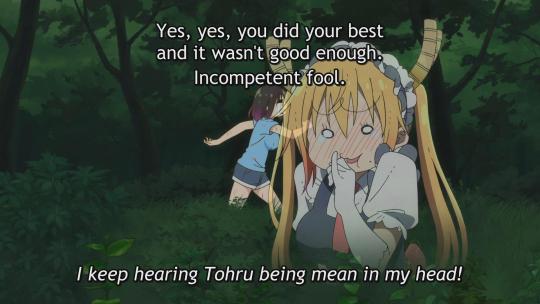
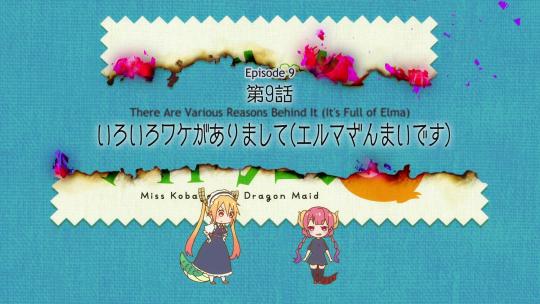
The word for “full of” in the title here is ざんまい zanmai (a suffix form of 三昧 sanmai), usually meaning that there’s a whole lot of [whatever] to immerse oneself in. I mostly bring it up because there’s a famous restaurant chain called Sushi Zanmai that specializes in, obviously, sushi.
And you know, Elma is a water dragon that looks kinda like an eel… I’m just sayin’…
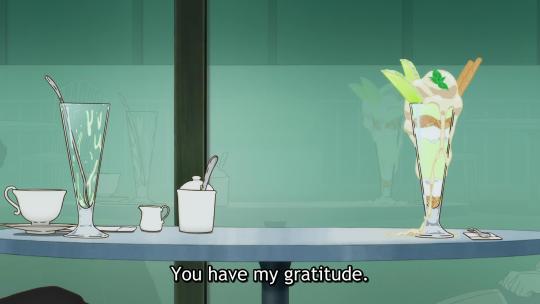
Not really a translation note, but wild that Elma didn’t even touch her parfait. (Not so wild that Fafnir finished his so quickly.) Serious business ahead...
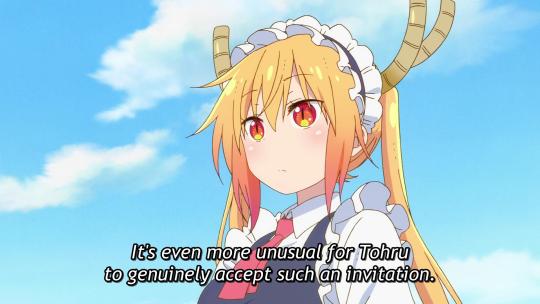
“Genuinely” here is 素直��� sunao ni, where the “ni” is used like “-ly” to make sunao work as an adverb. Sunao itself is an interesting word that falls into that category of “simple concept that is often hellish to translate.”
For some context, the first character, 素, is also used in the word 素顔 sugao, which is a face without makeup and 素材 sozai, basically raw ingredients/materials. The second, 直, is used in words like 直線 chokusen, a straight line, or 正直 shoujiki, honest.
Put them together, and you’ve got a word with connotations of directness and being unadorned. The original definition of the word tends toward “simple, natural” in the sense of e.g. life growing up on a rural farm.
The more common use for it these days is to describe people and their actions. Positively, it can mean something similar to a person being happy to help, or kind of like the opposite of conniving; open, frank, genuine. Less positively, it can mean someone is too trusting and easy to trick into doing things OR someone who is “too honest” and says hurtful things.
(If it helps: tsundere characters are often described as explicitly not sunao.)
In this case, the idea is that Tohru accepted the invitation easily as-is, without putting any conditions on it, or doing any “ugh, what a pain, do I have to, jeez” rigamarole—she just accepted. Another way you could put it in this case might be “It’s even more unusual for Tohru to accept an invitation like this without a fuss.”
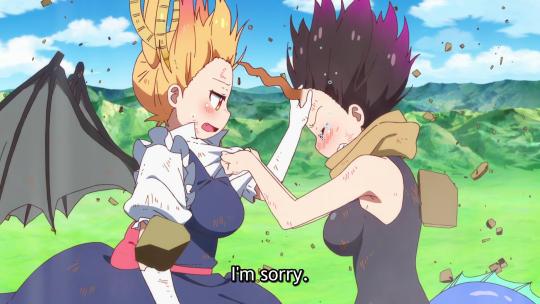
Just to point out the hand on head thing again.
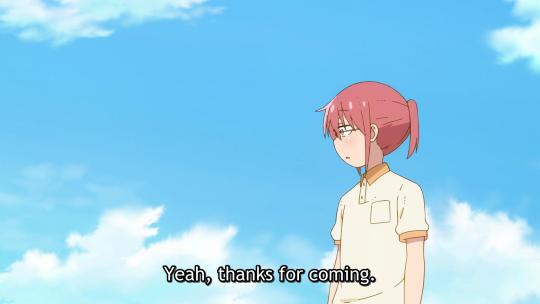
Also just to point out that this is another example of otsukare, as a reminder of how ubiquitous that word is.
And it makes a good place to end on: thanks for reading!
44 notes
·
View notes
Text
Come with the Wind
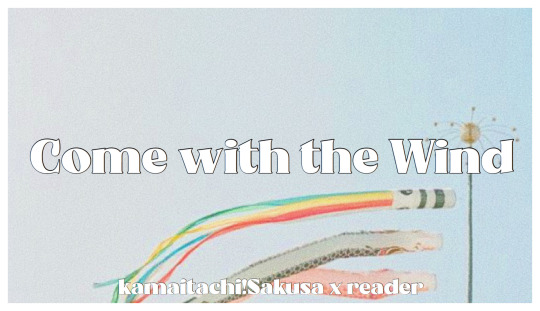
Kinktober 2020 — knife play
A/N: this is directly inspired by Sakusa’s merch design from the hyakki yakou (hundred ghouls marching at night????) line Jump released a while back where we get kamaitachi!sks and i just thought he was perfect for this prompt hhhhh
Pairing: kamaitcahi!Sakusa Kiyoomi x f!reader
Description: Sakusa Kiyoomi knocked you off your feet the moment he first entered your life as a strong whirlwind out of nowhere.
Warning: mention of causing wounds on people, non-threatening stalking behaviour (?), non-threatening breaking in behaviour (?), knife play but kinda tender, vaginal penetration, creampie
Word count: 3824
(more of the modern magic au here)
-
鎌鼬 (kamaitachi): a youkai in Japanese folklore that looks like a weasel with claws shaped like sickles (for the sake of visual aesthetics kamaitachi sakusa will have it on his tail instead). It is said that this youkai appear in the form of a whirlwind, knocking its victims to the ground before slitting long cuts on their skin. Despite the wounds, the person who got attacked would not feel any pain.
-
Sakusa Kiyoomi knocked you off your feet the moment he first entered your life as a strong whirlwind out of nowhere.
Quite literally, knocking you off balance and making you fall onto the ground on your knees.
He showed up in the form of a strong turbulent, tripping you when you were alone on the quiet streets of your neighbourhood. Sakusa eyed you up and down as you laid on the cement floor, too shocked by the man that appeared out of nowhere to even move. Your eyes widening when you saw the long tail swaying behind him and the sharp hook that was at the very end.
In a world where the inhuman and human lived as one society, the many youkais that had inhabited Japan way before your kind did were starting to blend into the modern city life as well. But there would always be some that could not, or refused to, give up on the way they had lived by far before they were anything but a story passed on from generation to generation.
Except, unlike the generations before, people of the current day now knew for a fact that these monsters lurking in the shadows were very much so real and waiting for a chance to strike when your guard was lowered.
The kamaitachi stared at his victim, finding somewhere to place the wound. The preferable tactic was to do it fast and precise, but Sakusa always had trouble with making a haste decision. Very inconveniently so, he had quite the distaste towards getting blood on himself and would rather pick a position on the delicate human body that would cause less bleeding.
Blood was messy, and it was hard to wash off of the fleece on his tail once it got on there. He did not like the mess at all.
The purpose of youkais of his kind was not to cause bloodshed. Well, actually, he wasn’t all too sure what the purpose truly was, given that he really wouldn’t gain from any of this. He had simply been told that this was what his kind did, and he carefully followed this task bestowed on him by his origins for more years than any of the measly humans that had been tripped by his wind could count.
So that was what he had been doing ever since he had a memory of his existence, and he intended to finish his task this time around too. But when his eyes met yours, your lips slightly agape as you sat on the ground from the shock, he found that he couldn’t swing the hook of his tail down onto your skin.
His moment of hesitation was enough for you to come back to your senses, climbing up with scrambled steps as you dashed towards the direction of your house without the time to even look back.
Sakusa realised that he was staring at the floor when he snapped out of his trance, letting out a muffled groan as he looked towards the direction you had headed.
What was it? Why didn’t he do it?
Sakusa had never felt so tortured in his many years of life than he did after he let you escaped completely unharmed. He had failed his one job for the first time ever and he wasn’t the happiest about it. This wasn’t right. He couldn’t get you out of his head no matter how hard he tried and it was really, really irritating him.
It must be that he couldn’t stand having an unfinished job, it must be it.
-
He spent the next few days in the air of the neighbourhood he saw you at, which wasn’t exactly his proudest moment. It was stupid for him to care so much about a random human that got away through luck, but he was determined that he would right his wrong. There were several times when he caught you alone, but he never managed to do it. He spent a lot of time observing you but always missing the prime timing. It could be that he was far too enticed by the book you were reading (which he tried very hard to see the title clearly because he was so far away from you), or he simply got lost in the way you laugh to yourself when you thought no one was watching (he was, in fact, watching), but he always remembered in absolute frustration that he was there for a proper reason when you had left.
So he kept going back to you again and again, waiting for the chance to make his strike.
Not because he wanted to, absolutely not.
He swore he only found out about where you lived on accident. He wasn’t really intending to be so stalker-ish but one day when he didn’t see you around all day long when he was waiting for you to show up only to spot you pacing down the streets late at night, he thought that it was absolutely foolish for you to be alone at the hour and just had to make sure you got back to your place safely. Humans were very fragile creatures was what he had learned after years of observation, and if you happened to bump into any of the more vicious youkais or worse, vicious humans, then he wouldn’t get to finish his task with you gone.
(He grumbled, as if he wasn’t one of the said dangerous youkais lurking around.)
He had resisted the urge to look into your house. There were youkais that broke into people’s residents but that wasn’t the nature of his kind and he intended to stay in his own lane. But now that he knew where you lived, it was getting harder and harder for him to stay away.
Sakusa was circling the area midair one day when he saw that the door to your tiny balcony was wide open. He felt his eyelids jumped, did no one ever tell you that you should keep all doors and windows locked when you were out? He floated close with a disapproving tsk of his tongue, wanting to help you close it up when he got a brief glimpse of what was behind the window.
He swore to all the gods whose name he could not even remember because they were far too long to utter out that he had never seen a more horrendous sight.
He took a step back, absolutely disgusted. Had humans gotten to this point of their survival now? That they could live in a condition like this? “Unbelievable,” he muttered to himself as he tentatively entered your home, careful not to step on anything that was on the ground.
The trash can at the corner was filled to the top and threatening to spill out. He felt a sharp ache banging in his head when he saw the empty boxes piled up at the side. There were bunches of tissue paper shoved onto the back of your table that had no empty space on it with so many things that were scattered on top. Now that he started paying attention, there were marks on your balcony window clearly left behind because you never bothered to wipe it clean after downpours of rain.
Ridiculous. His brows furrowed together in disapproval, picking up any trash on the ground with the hook of his tail as he inspected the place.
This would not do, he would not allow it.
Right, he clicked his tongue as he looked around, searching for anything that resembled a broom, where should he start?
You were sure you must have tired yourself too much that you were starting to see illusions when you came home that night to see the same kamaitachi who had shoved you to the ground and proceed to let you escape furiously wiping your window with a towel hooked onto his tail while grumbling about how stubborn the stains were. You did not dare to move when he must have heard you come in, slowly and stiffly turning around until you two were staring at each other. Neither of you said a word, and you blinked as you tried to make sense of the situation.
You didn’t know that kamaitachis also break into people’s houses just to help with the cleaning?
“Um,” you gulped, feeling small under his inky eyes even though he was the intruder here, “do you want something to drink?”
This was wrong. Kamaitachis were not supposed to mingle with the mankind. He should have escaped through the little gap on the window he had left for ventilation (your house was far too dusty for his comfort), or throw you off by causing a whirlwind inside your tiny city apartment which was guaranteed to make quite the destruction., or just do what he thought he was there to do all along and slit an open wound on any part of your skin.
Sakusa Kiyoomi had a moment of silence when he realised that he didn’t want to do any of those things.
He did, however, really wanted warm tea.
-
Sakusa Kiyoomi made several discoveries about humans after he met you:
1. under the right amount of pressure, they are able to keep up with a hygienic living environment, you were just too lazy for your own good
2. they make really decent tea (you made him this thing where you pour tea onto rice and umeboshi once and he was completely floored)
3. they invite people to move into their residence as a gesture of affection (you had brought it up after he waited outside your balcony for a good hour before you came home and let him in, claiming that he always around anyways
4. youkai-human romances are a thing now and people wouldn’t get burned alive for it (you laughed very hard when he brought up his concerns on why you didn’t have any issues letting your neighbours see you with him, he didn’t understand why)
Oh, and they were soft, very soft. Sakusa held you just a little closer to his chest as you two sat cross legged on the mattress, his arms wrapped around your waist as he leaned his jaw onto your shoulder while you mindlessly played with his tail.
So soft.
“Careful,” he warned when he saw you tracing your finger along the edge of his reaping hook, “you’re going to cut yourself if you slip.”
You chuckled, watching as he flicked his tail as far away from you as he could. “Shouldn’t you want that to happen?” you mused, twisting around so you could see his face. The two dots above his eyebrow shifted as he narrowed his eyes, his lips pursed into one thin line. You could see the very tip of his tiny white ears peeking out of his wavy black curls, twitching ever so slightly.
He sighed, clicking his tongue at your triumphant expression like you had gotten him good. Light reflected on the silver blade as he lifted it up to your eye level, twisting it slowly so that it glimmered. He always kept the blade clean and sharp even though he hadn’t used it since meeting you. You could see your own reflection on the polished surface and you stared into his inky eyes through it.
For a moment, you were mesmerised, and you could hear your own breaths as your gaze travelled to the very tip of the hook which could draw blood even from the slightest bit of force.
“Omi,” you licked your lips and gripped onto his forearm that was around your stomach, “is it true that I wouldn’t feel it even if you slice down?”
His eyes widened, “I’m not hurting you.”
“I know, but is it?”
Sakusa paused, he hadn’t thought about it in a long time. Gently and with caution, he turned his hook to its dull edge and trail it up to your leg. You stiffen at the feeling of the cold metal on your skin, goosebumps rose on your skin where the hook just grazed past.
“Apparently,” he said, his voice coming out as a whisper as he took in your reaction. Any hint of fear and he would pull back, but you only seemed to lean back against his chest even more as he brushed the blade along your calf. You were so delicate, he could leave such nasty scars on your skin if he did so little as flick down and you knew it. But the heaving of your chest only got more obvious when the edge of his blade reached higher and higher up on your leg until it was pushing up the hem of your shorts.
He stopped when the curved hook was right at the root of your thigh, and pressed the flat edge down.
He nearly lost control of himself when he heard the faintest resemblance of a moan slipping from your mouth.
“Do you like this?”
Your face burned up at the question and the gravel in his tone. His arms slowly pulled away from your waist, warm palms running along the curve of his waist until they were resting right at the side of your hips. Your breath hitched when you felt his fingers digging down and gripping onto the hem, the fabric of your shorts now bunched up around the silver hook.
“Do you like this?” he asked again, the fleece of his tail brushing against your skin as he crooked the tip. You could see it poking under the fabric, pulling it taunt around the edge, and you felt your own voice betraying you at the thought of how easy it would be for him to just ripped it to pieces.
“Yes.”
A loud tear ripped through the room and sent numbing sparks all the way to your scalp as you held your breath in reflectively, the hook gliding across the flimsy fabric of your room wear and dangerously close to the sensitive skin of your inner thighs.
You whimpered when he slipped his hand under the baggy t-shirt you were wearing, pushing it up until your bare chest was out on display.
“Bite.”
You parted your mouth and took the hem between your teeth, the heat spreading onto the tip of your ears at your lewd position. He brought the sickle up, his eyes bearing at your form when he slowly ran the dull edge down the valley of your breast and onto your stomach. You wanted to arch against him so badly but held yourself still, your shoulders shaking slightly as you did not dare to move.
“I remember how people used to scream when my blade touches their skin,” his lips ghosted on where your neck met your shoulder, warm breath fanning onto you and making every hair on your back stood up. He sniggered when he heard your breath getting heavier when he brought the blade to your front. The chilling metal barely touched your nipple before it pebbled up and stood almost painfully. “But getting aroused... that is a first.”
“O- omi...” you managed to utter his name through your teeth and he brushed against your nipple with a flick, the feeling of steel still lingering on the sensitive bud.
“Look at you getting all antsy,” he clicked his tongue and the sound sent shivers down your spine. He shifted underneath you, hoisting you higher up on his lap. Something hard poked at your ass as he held you still, his erection pressed firmly against you through the shorts that were struggling to hold together.
You let out a pitiful whine when he hooked one nimble finger under the crotch of your panties while the sickle scrapped down from your shoulder to your arm, an inaudible rumble slipping from the back of his throat when he felt the slick that had seeped into the cotton.
Humans, their bodies react in the most fascinating ways.
You froze when the hook brushed past your inner thigh and under the strip of fabric his fingers were holding onto.
“Scared?” he asked, the elastic choking snugly around your skin in tension as he held the hook still, “just one wrong move and I could hurt the most delicate part of your body.”
You pussy couldn’t help but clench around nothing when he cut the last bit of fabric covering you with a forceful pull, the clear essence that was already pooling up all the more obvious when dripped onto the metal.
“Tsk tsk...”
You could not even press your thighs together to get the friction you so desperately wanted with his hand giving you a squeeze in warning, bringing the hook up to your face as he turned it under the light.
“You are getting my sickle all dirty,” he said, referring to the shine on the usually spotless surface that was from your arousal. Sakusa’s fingers danced along your inner thigh before bringing them to your sopping folds, brushing past your slit and felt the wetness gushing out.
He brought the hook to his lips and poked his tongue out, the sound of his tongue against the metal where it had just touched your skin forming a blood curling image in your head even though you could only hear him. He twisted his tail, letting his tongue ran along the blade from the base to the tip.
You whimpered when you felt the coldness of his saliva on the blade right at the side of your neck.
“Up.”
You shakily lifted yourself off his lap, getting onto your knees as you waited with bated breath. The sound of zippers had your heart pounding in your chest all while the sharp blade of the reaping hook was starting to make your skin go numb.
He could slit your throat if he wanted to.
Your jaw was aching from how hard you bite down and it only got worse when you felt his tip prodding at your entrance. He signaled you to sink down with a tap of his finger at the side of your hips. You could not hold yourself back anymore as his girth slowly stretched you out, your shirt falling back down over your abdomen as a breathy moan rolled off your tongue.
“Mph-” your toes curled when he was balls deep inside of you and he tilted your head back until the curve of your neck leaned right on his shoulder with the tip of his sickle, the metal growing warm under your chin as he held you there.
He groaned at the feeling of your tight walls around his cock, the sudden penetration without any foreplay had your cunt now leaking with wetness just to get used to him.
He slowly started rocking against you before upping his pace. He throbbed inside of you, the heat of him burning into your lower stomach and spreading all over your body. His fingers dug into the soft flesh of your hips, guiding you to roll against him all the while never removing the blade from your neck. You let out a choked mewl when the tip of it trailed down your neck, poking against the fragile skin ever so slightly when he thrust up.
Sakusa had never felt any hint of emotions in his brain when he held his blade at any of his past victims, he did it because that was simply what his kind does and that was it. But when he saw the lighter streaks left on your skin where the tip of his sickle had pressed down on, your breaths rigid but with desire dripping from each heave of your chest, he felt all sorts of feelings screaming in his head until all he could do was lash them out through each merciless rut of his hips.
The sound of his balls slapping against your ass bounced off the walls as you panted, your hands threw back to circle around his neck the blade was pressed down flat on your neck. It almost felt like you were being choked as the metal grew warm on your skin, your eyes seeing white in the corners as your walls contracted around him and his name slurred off your tongue like a mantra.
A low moan rumbled from his chest at your walls clamping down on him and the vibration seeped through your back, making you whimper. You sucked in a hasty breath when the hook was removed from your throat, his tail stiffening up at the side as he felt his own climax getting close. He buried his face at the crook of your neck, muffling his moans as he held you tight against him.
He came with a shudder, his hands still clutching you tightly before his muscles relaxed and he slumped onto your body. Your lips parted to let out a soft sigh at the feeling of his release inside of you, the sticky substance slowly leaking out of your fluttering folds down onto the base of his cock with him still buried inside of you.
His tail, the part that was just fur and not blade, rubbed soothingly against your waist as he gently lifted you off his lap. You whimpered at the feeling of his warmth leaving your body, the sudden emptiness making your still sensitive walls clenched and more of his cum trailed down. Turning you around so that you could lay on his chest, you listened to his heartbeats slowly easing down from the rapid beating as it rose and fell underneath your chin.
His tail was swung over your back, locking you in as his palm ran up and down on your back. You brushed at the white fleece with your finger, a light coo slipping past your lips at how soft it was. It was a wonder how just a few inches down and the fur would blend in with the unbending steel of his sickle.
“You know,” you said, still relishing in the feeling of his fur brushing past your finger tip, “sometimes I’m really glad that you tried to attack me that day.”
He huffed, “You mean you’re glad I didn’t actually do it?”
“Well,” you looked up, smiling a little as you stared into his inky eyes, “you would not be here if you didn’t stalk me weeks after that because you let me went away.”
“I did not stalk you.”
“Yes you did!” you laughed when he rolled his eyes. You paused, letting out a short hum before leaning your jaw on his chest again.
“I’m happy you did though.”
He looked down at your murmur, and closed his eyes as he took in your scent with his face buried into your hair.
Sakusa Kiyoomi came into your life as a strange, sudden whirlwind and in a stunning twist of events against his very nature, he stayed.
And he was very happy he did that too.
#haikyuu imagines#haikyuu imagine#haikyuu x reader#haikyuu smut#sakusa x reader#sakusa imagine#sakusa imagines#sakusa smut#kinktober 2020
409 notes
·
View notes